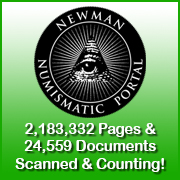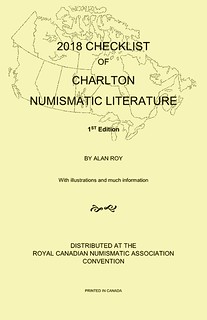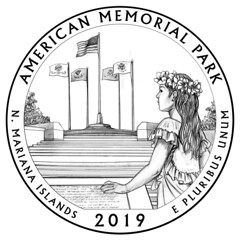
About UsThe Numismatic Bibliomania Society is a non-profit association devoted to the study and enjoyment of numismatic literature. For more information please see our web site at coinbooks.org SubscriptionsThose wishing to become new E-Sylum subscribers (or wishing to Unsubscribe) can go to the following web page link MembershipThere is a membership application available on the web site Membership Application To join, print the application and return it with your check to the address printed on the application. Print/Digital membership is $40 to addresses in the U.S., and $60 elsewhere. A digital-only membership is available for $25. For those without web access, write to: Terry White, Treasurer AsylumFor Asylum mailing address changes and other membership questions, contact Terry at this email address: terrywhite5475@yahoo.com SubmissionsTo submit items for publication in The E-Sylum, write to the Editor at this address: whomren@gmail.com
BUY THE BOOK BEFORE THE COINSale Calendar
|
- WAYNE'S WORDS: THE E-SYLUM AUGUST 22, 2018
- NBS PRESIDENT TOM HARRISON'S CONVENTION MUSINGS
- ADAMS NUMISMATIC LIBRARY SALE HARDCOVER EDITIONS
- HOLABIRD OFFERS MINING AND FINANCE LIBRARY
- NEW BOOK: CHARLTON NUMISMATIC LITERATURE
- NEW BOOK: THE PILLAR COINAGE
- NEW BOOK: WORLD'S MOST BEAUTIFUL LIBRARIES
- BOOK EXCERPT: A NATION OF DEADBEATS
- BOOK REVIEW: PEACE MEDALS
- BOOK REVIEWS: TOKENS OF KOREA
- DON BAILEY (1933-2018)
- RESEARCHERS PUT EARLY SILVER COINS TO NEW TESTS
- NOTES FROM E-SYLUM READERS: AUGUST 19, 2018
- THOUGHTS ON MICRO-ENGRAVED BANKNOTES
- ON THE PENNSYLVANIA FIRST DEFENDERS MEDAL
- DISCOVERY SPECIMEN 1943 BRONZE CENT GRADED
- VOCABULARY TERM: COMPUTER ENGRAVING
- TRUMAN BISHOP DISNEY (1829-1884)
- 2018 PROFESSIONAL NUMISMATISTS GUILD AWARDS
- 2019 AMERICA THE BEAUTIFUL QUARTER DESIGNS
- MOLDOVA'S COLLECTIVE "JIGSAW PUZZLE" COIN DESIGNS
- GASVODA PURCHASES CLASSICAL NUMISMATIC GROUP
- HOLABIRD AUGUST 2018 AMERICANA SALE HIGHLIGHTS
- NUMISMATIC NUGGETS: AUGUST 19, 2018
- WAYNE'S NUMISMATIC DIARY: AUGUST 19, 2018: PART 1
- WAYNE'S NUMISMATIC DIARY: AUGUST 19, 2018: PART 2
- WAYNE'S NUMISMATIC DIARY: AUGUST 19, 2018: PART 3
- WAYNE'S NUMISMATIC DIARY: AUGUST 19, 2018: PART 4
- YOUNG COLLECTOR ACTIVITIES IN AUSTRALIA
- IN OTHER NEWS: AUGUST 19, 2018
- 1921 ANA CONVENTION LADIES PHOTO
- SOME OF THE WORLD'S MOST BEAUTIFUL LIBRARIES
- FEATURED WEB SITE: BARRINEAU CURRENCY
Click here to access the complete archive
To comment or submit articles, reply to whomren@gmail.com
Content presented in The E-Sylum is not necessarily researched or independently fact-checked, and views expressed do not necessarily represent those of the Numismatic Bibliomania Society.
WAYNE'S WORDS: THE E-SYLUM AUGUST 22, 2018
 New subscribers this week include:
Jeff Nelson, courtesy of Jim Contursi;
Mike Barry,
David Hoover,
Joe Lang,
Lee Minshull,
Jim Paicz,
Arthur Stephen Patrick, and
Maryna Syntsya.
Welcome aboard! We now have 5,786 subscribers.
New subscribers this week include:
Jeff Nelson, courtesy of Jim Contursi;
Mike Barry,
David Hoover,
Joe Lang,
Lee Minshull,
Jim Paicz,
Arthur Stephen Patrick, and
Maryna Syntsya.
Welcome aboard! We now have 5,786 subscribers.
Thank you for reading The E-Sylum. If you enjoy it, please send me the email addresses of friends you think may enjoy it as well and I'll send them a subscription (but let me know if they are located in the European Union). Contact me at whomren@gmail.com anytime regarding your subscription, or questions, comments or suggestions about our content.
This week we open with convention musings from the NBS President, a hardcover catalogue offer, a future library sale, three new books, one excerpt and three reviews.
Other topics this week include research into early silver coins of the U.S. Mint, the Pennsylvania First Defenders medal, the discovery specimen of the 1943 bronze cent, computer engraving, new U.S. coin designs, and Georgia currency.
To learn more about American financial history, Charlton numismatic literature, Peace medals, Don Bailey, laws on defacing banknotes, jigsaw puzzle coin designs, the 5 Cent Forage and inductively coupled plasma atomic emission spectroscopy, read on. Have a great week, everyone!
Wayne Homren
Editor, The E-Sylum
NBS PRESIDENT TOM HARRISON'S CONVENTION MUSINGS
NBS President Tom Harrison submitted this note about the recently concluded American Numismatic Association World's Fair of Money. -Editor
I want to share a couple of random thoughts and observations from the just completed Numismatic Bibliomania Society events at the ANA Convention in Philadelphia. This year we had over twice the number of donors to the NBS benefit auction as compared to 2017. There was an amazing variety of quality lots that sparked spirited bidding on many items. These donors, combined with twenty enthusiast bidders, raised over $9000 for the NBS!!
This year we renewed our tradition of hosting a club table. The table provided an opportunity for literature enthusiasts to meet, enjoy a marvelous Chapman Brothers M.A. Brown Sale display, view Friday's auction items and purchase NBS souvenir mugs. I'd like to thank those who manned the NBS table and encouraged new members to join the club. This was another example of NBS members freely giving of their precious time to benefit the mission of the NBS.
I sincerely appreciate each member's contribution to a great week of NBS fun and fellowship.
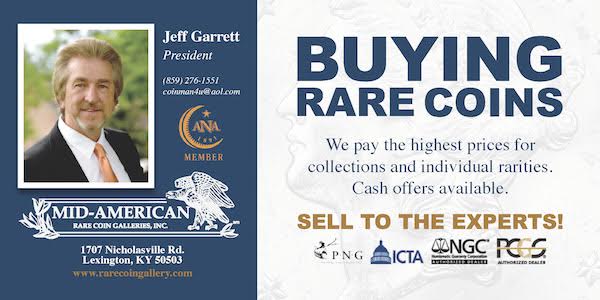
ADAMS NUMISMATIC LIBRARY SALE HARDCOVER EDITIONS
Numismatic booksellers Kolbe & Fanning are offering hardcover versions of the catalog of their recent sale of highlights from the John W. Adams Numismatic library. -Editor
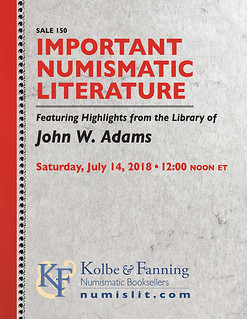 Kolbe & Fanning will be producing hardcover editions of the amazing John W. Adams Numismatic Library Sale.
Kolbe & Fanning will be producing hardcover editions of the amazing John W. Adams Numismatic Library Sale.
We will be producing a maximum of ten Deluxe Editions of the sale available for pre-order for $400 per copy.
We are offering our regular hardcovers for a special pre-order price of $60. Copies sold after pre-orders close will be available for $75 through our website. Subscribers to Kolbe & Fanning hardcovers will receive this edition for the regular subscriber price of $50.
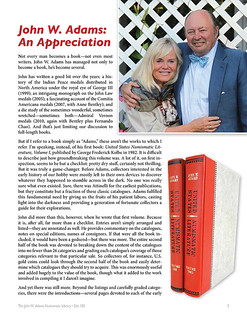
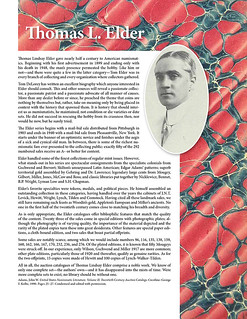
For more information, or to order, see:
https://www.numislit.com/new-arrivals.php?orderBy=saleprice2&action=recarr&cat_conj=or&category_id=280
HOLABIRD OFFERS MINING AND FINANCE LIBRARY
Fred Holabird submitted this announcement of his upcoming sale of a landmark library of material on American Mining and Finance. -Editor
Important American Mining and Finance Library
Holabird's Western Americana announces the sale of one of the great private research libraries. This original source material library centers on several key and important categories:
1. American Mining History. Covers all facets of antiquarian mining in America, from c1770 to c1950. The library covers almost every American mining rush, from Maine and Newfoundland westward to California.
2. American Financial History. c1770-1945, including a number of early American key and important series where few are known today, c1780-1850
3. The History of Assaying and Metallurgy, as well as early mining history. Contains many exceptional rarities and early works back to c 1600. Includes: first English translation of Pliny, Agricola, both Pettus, etc.
4. History of Precious Metals, including numismatics.
5. American Directories. These are critical reference works to determine backgrounds of American businessmen. The collection numbers approximately 350 different directories, many used in the owner's published works. They center around the decade or two prior to the California gold rush period and beyond. Includes an important huge string of New York City directories, nearly impossible to replicate today.
6. Railroad history. From Poor's volumes to the volumes on Railroad Officers, etc.
The contents of the library are so rare that in many instances the only copy ever seen for sale over a span of approximately 40 years was purchased, regardless of condition. The library's owner always cared about content, and was not a “cover” book collector, caring more for the quality of the work contained and presented by the original authors. Others still have been professionally restored. Many are from the libraries of important historical financial figures or men of science.
The library will be offered in several parts now through December through Holabird's auction sales. For more information, please contact Fred Holabird, 775 851-1859, or fredholabird@gmail.com
To visit the Holabird Americana web site, see:
http://holabirdamericana.com/

NEW BOOK: CHARLTON NUMISMATIC LITERATURE
Alan Roy has published a useful 20-page free checklist of Charlton publications. Thanks! -Editor
I did a talk, an introduction to collecting Canadian numismatic literature, at the RCNA convention and wanted to give the audience something to take home with them. So I created a "Checklist of Charlton Numismatic Literature". I'm hoping this will provide interest in some to begin collecting the most popular series of coin catalogues published in Canada.
If anybody has questions or corrections, I can be reached at alroy477@gmail.com
Here's an overview from the publication's Introduction. -Editor
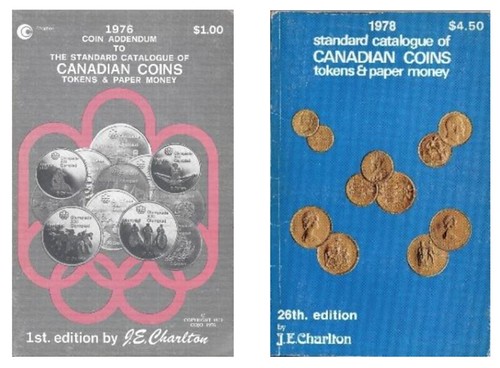
The Charlton Catalogue has been the true “standard” for Canadian collectors for over sixty years. James E. Charlton, the proprietor of Canada Coin Exchange, began publishing a pamphlet listing the values of Canada's coins. He wasn't the first; New York dealer Wayte Raymond had already issued a price guide to Canada's decimal coins and tokens. But Charlton began publishing his catalogue yearly, and it was well received. Whitman Publishing of Racine, Wisconsin began printing Charlton's catalogue in 1960. Many collectors are now familiar with these blue hard cover catalogues. Whitman's distribution system increased sales. After the Charlton catalogue returned to Canada in 1971, Whitman decided to produce a competing reference called Coins of Canada, by James Haxby and Robert C. Willey.
A boom in the coin market prompted Charlton Publishing to make changes to the Standard Catalogue. It was split into several separate volumes covering coins, bank notes, government paper money, and colonial tokens. In the late 1970s and early 1980s, they began publishing the Standard Catalogue of Canadian Coins twice a year to document the quickly rising prices in the coin market.
Since the 1990s, Charlton sought to expand its scope by publishing catalogues on Canadian Tire cash bonus coupons, die varieties, medals, communion tokens, trade dollars, and more.
To download a free copy, see:
https://drive.google.com/open?id=1oUZu-qTlk22MD4eRl0Vv6QXAkk8bvHyP
NEW BOOK: THE PILLAR COINAGE
Author Brad Yonaka shared this press release for his new book on pillar coinage. Thanks! -Editor
A Variety Guide to the Pillar Coinage of the Guatemala, Bogota, Lima, Potosi, and Santiago Mints 1751-1772
by Brad Yonaka
ISBN: 978-0-9986825-1-8
377 pp. | 8 ½ x 11 inch softbound
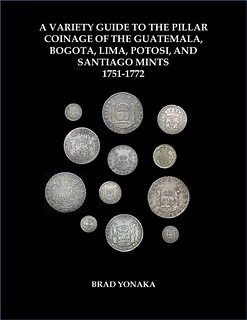 In 1728 a royal decree from Philip V mandated the manufacture of machine-struck coins in the
Spanish colonial mints. However, the mints of Guatemala, Santa Fe de Bogota, Lima, Potosi, and
Santiago were only able to fully comply, at the earliest, over twenty years later. The coins were dubbed
pillars or ‘columnarios' due to the prominent rendition of the Pillars of Hercules flanking globes
symbolizing the Old and New Worlds, united under the Spanish banner. They, along with nearly identical
coinage already being produced in Mexico City, quickly became an international currency, trusted and
traded around the world.
In 1728 a royal decree from Philip V mandated the manufacture of machine-struck coins in the
Spanish colonial mints. However, the mints of Guatemala, Santa Fe de Bogota, Lima, Potosi, and
Santiago were only able to fully comply, at the earliest, over twenty years later. The coins were dubbed
pillars or ‘columnarios' due to the prominent rendition of the Pillars of Hercules flanking globes
symbolizing the Old and New Worlds, united under the Spanish banner. They, along with nearly identical
coinage already being produced in Mexico City, quickly became an international currency, trusted and
traded around the world.
This book, self-published in August 2018, is a detailed variety guide for all denominations (half, one, two, four, and eight reales) of the pillar issues from the mints of Guatemala, Santa Fe de Bogotá, Lima, Potosi, and Santiago. It is essentially a companion volume to a previous offering by the author entitled “A Variety Guide to the Fractional Pillar Coinage of Mexico City, 1732-1771”. As such the layout is quite similar. The targeted audience is the collector of Spanish colonial coinage, and presumes the reader has a basic knowledge of 18th century minting processes. It draws from a database of nearly 4000 high resolution coin images gathered over a period of eleven years from online auctions and photographs of private collections.
It has been over a decade since the last published accounting of die varieties for these series, and since that time, a significant number of previously unlisted design variations have been recorded by the author. Additionally, some speculative variety types and dates listed but unproven in past research are refuted by lack of current evidence, to the end of simplifying the task of the ardent variety collector.
With over 550 black and white photos of full coins and close-ups of variety details, this book strives to provide collectors with the most descriptive tools possible in pursuit of this famous coin type, from the relatively abundant eight reales issues of Lima to the ultra-rare minors of Santa Fe de Bogota and Santiago. Full cross references to previous catalog numbers (if they exist) are given for each entry.
The book also contains descriptive and historical information on the various mints, estimated rarities (based on the author's extensive auction database and comprehensive die pairing study), and pricing guide based on recent auction results. Price: $36, add $5 for shipping within USA. Overseas shipping please inquire.
Order by sending personal check to:
Agorocu Consulting Inc.
PO Box 41515
Long Beach, CA 90853
Or payment by Paypal to:
acanthite@live.com
To read the earlier E-Sylum article, see:
NEW BOOK: MEXICO CITY FRACTIONAL PILLAR COINAGE
(http://www.coinbooks.org/v20/esylum_v20n26a04.html
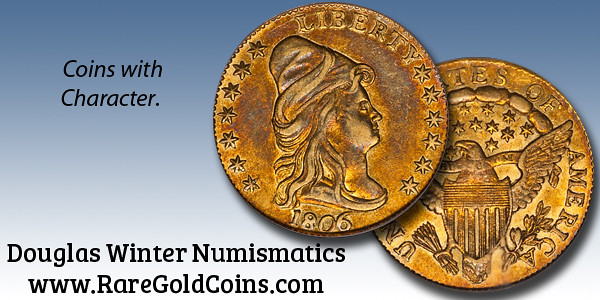
NEW BOOK: WORLD'S MOST BEAUTIFUL LIBRARIES
Getting away from numismatics for a moment to focus just on books, there's a new one sure to delight the bibliophile. Here's the description from Amazon. See the last article in this issue for selected photos I found on the Colossal blog. -Editor
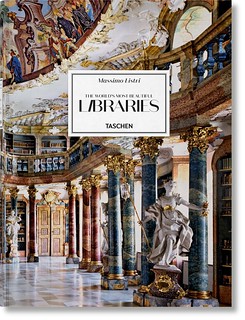 From the mighty halls of ancient Alexandria to a camel bookmobile on the Kenyan-Somali border, human beings have had a long, enraptured relationship with libraries. Like no other concept and like no other space, the collection of knowledge, learning, and imagination offers a sense of infinite possibility. It's the unrivaled realm of discovery, where every faded manuscript or mighty clothbound tome might reveal a provocative new idea, a far-flung fantasy, an ancient belief, a religious conviction, or a whole new way of being in the world.
From the mighty halls of ancient Alexandria to a camel bookmobile on the Kenyan-Somali border, human beings have had a long, enraptured relationship with libraries. Like no other concept and like no other space, the collection of knowledge, learning, and imagination offers a sense of infinite possibility. It's the unrivaled realm of discovery, where every faded manuscript or mighty clothbound tome might reveal a provocative new idea, a far-flung fantasy, an ancient belief, a religious conviction, or a whole new way of being in the world.
In this new photographic journey, Massimo Listri travels to some of the oldest and finest libraries to reveal their architectural, historical, and imaginative wonder. Through great wooden doors, up spiraling staircases, and along exquisite, shelf-lined corridors, he leads us through outstanding private, public, educational, and monastic libraries, dating as far back as 766. Between them, these medieval, classical, baroque, rococo, and 19th-century institutions hold some of the most precious records of human thought and deed, inscribed and printed in manuscripts, volumes, papyrus scrolls, and incunabula. In each, Listri's poised images capture the library's unique atmosphere, as much as their most prized holdings and design details.
Featured libraries include the papal collections of the Vatican Apostolic Library, Trinity College Library, home to the Book of Kells and Book of Durrow, and the priceless holdings of the Laurentian Library in Florence, the private library of the powerful House of Medici, designed by Michelangelo. With meticulous descriptions accompanying each featured library, we learn not only of the libraries' astonishing holdings – from which highlights are illustrated – but also of their often lively, turbulent, or controversial pasts. Like Altenburg Abbey in Austria, an outpost of imperial Catholicism repeatedly destroyed during the European wars of religion. Or the Franciscan monastery in Lima, Peru, with its horde of archival Inquisition documents.
For more information, or to order, see:
Massimo Listri: The World's Most Beautiful Libraries XXL (Multilingual Edition) (German, French and English Edition) (German) Hardcover – July 4, 2018
(https://www.amazon.com/gp/product/3836535246/ref=as_li_tl)
Temples of Knowledge:
Exceptional access to the world's illustrious libraries
(https://www.taschen.com/pages/en/catalogue/photography/all
/05763/facts.massimo_listri_the_worlds_most_beautiful_libraries.htm)
BOOK EXCERPT: A NATION OF DEADBEATS
Pablo Hoffman forwarded a post from the Delancey Place blog with an excerpt from the 2012 book A Nation of Deadbeats by Scott Reynolds Nelson. -Editor
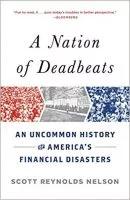 During the first years of the existence of the United States, its economy had been boosted by supplying the combatants in the Napoleonic Wars in Europe, supported by credit made available by the First Bank of the United States. That bank's charter ran from 1791 to 1811 and was not renewed because of opposition from Democrats. But in the waning years of that bank's life, its services had favored New England shipping merchants, who were largely Federalists, and those merchants were tied closely to British interests. In part because of those ties, they had opposed the coming War of 1812 with England. It was that divided loyalty that helped doom the Federalists as a viable political force:
During the first years of the existence of the United States, its economy had been boosted by supplying the combatants in the Napoleonic Wars in Europe, supported by credit made available by the First Bank of the United States. That bank's charter ran from 1791 to 1811 and was not renewed because of opposition from Democrats. But in the waning years of that bank's life, its services had favored New England shipping merchants, who were largely Federalists, and those merchants were tied closely to British interests. In part because of those ties, they had opposed the coming War of 1812 with England. It was that divided loyalty that helped doom the Federalists as a viable political force:
"Dissolving the Bank of the United States in 1811 was a crucial step toward war. Congress destroyed an efficient financial machine but also -- most assuredly -- a political one. Some Democrats believed that dissolution of the bank would finally prevent Britain from corrupting the American legislature. Federalists worried that the bank could no longer quiet the rumblings of a war with England. Whatever it meant, the destruction of the bank can be seen as the first shot in what Americans would call the War of 1812.
To read the complete article, see:
THE DEMISE OF THE FIRST BANK AND THE FEDERALIST PARTY -- 8/13/18
(https://delanceyplace.com/view-archives.php?p=3655)

BOOK REVIEW: PEACE MEDALS
Barry Tayman writes:
Readers may enjoy this article which includes very nice comments about the Gilcrease book on Indian Peace medals.
Barry forwarded an article by Smithsonian Secretary David J. Skorton reviewing "Five Books That Expand the Definition of Art". Thanks! Below is a link to an earlier E-Sylum article about the book which includes contributions from a number of our readers including Barry, John W. Adams, Skyler Liechty, Tony Lopez and the late George Fuld. -Editor
Peace Medals: Negotiating Power in Early America by Robert B. Pickering
Stebich's next selection tackles significant questions for many museum goers: what makes something a work of art and how do curators decide which objects have both aesthetic and historic resonance.
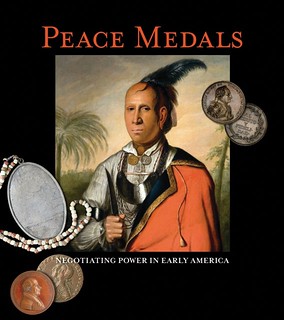 Exhibition catalogues, says Stebich, are often “the only lasting element of something that is, by nature, temporary.” Fortunately she's had the opportunity to see many museum shows across the country, including a 2011 exhibition, Peace Medals: Symbols of Influence and Prestige, at the Gilcrease Museum in Tulsa, Oklahoma, that has a catalogue that discusses the changing nature of art. Drawn from the museum founder's personal trove of silver and brass coins, the Gilcrease exhibition explores the historical and meaning of peace medals exchanged between explorers and Native American leaders, objects that weren't necessarily categorized as art in their time, but take on artistic meaning in the present.
Exhibition catalogues, says Stebich, are often “the only lasting element of something that is, by nature, temporary.” Fortunately she's had the opportunity to see many museum shows across the country, including a 2011 exhibition, Peace Medals: Symbols of Influence and Prestige, at the Gilcrease Museum in Tulsa, Oklahoma, that has a catalogue that discusses the changing nature of art. Drawn from the museum founder's personal trove of silver and brass coins, the Gilcrease exhibition explores the historical and meaning of peace medals exchanged between explorers and Native American leaders, objects that weren't necessarily categorized as art in their time, but take on artistic meaning in the present.
Starting with European settlers and continuing on through the founding of the United States, white leaders issued their Native American counterparts a kind of peace medal” to curry favor and build diplomatic alliances. Whether historical artifact or works of art, peace medals are not without controversy. Worn around the recipient's neck, they often incorporate Native American imagery, representing a pledge of peace.
“Through the catalogue, viewers can see how the imagery changed over time through various presidencies and how the medals were valued by the recipients and incorporate portraiture of Native Americans, giving a sense of status to the sitter,” says Stebich.
To read the complete article, see:
Five Books That Expand Our Definition of What Art Can Be
Read more at https://smithsoniansecondopinion.org/arts/stephanie-steibich-director-saam-180969647/#f0j1OPXwflgibzpR.99
(https://www.smithsoniansecondopinion.org/arts/stephanie-steibich-director-saam-180969647/)
I found another review online from AnthroSource, published by the American Anthropological Association. -Editor
To read the AnthroSource review, see:
Peace Medals: Negotiating Power in Early America. Robert B.Pickering, ed. tulsa, ok: gilcrease museum, 2012. 128pp
(https://anthrosource.onlinelibrary.wiley.com/doi/full/10.1111/muan.12032)
To read the earlier E-Sylum article, see:
NEW BOOK: PEACE MEDALS: NEGOTIATING POWER IN EARLY AMERICA
(http://www.coinbooks.org/esylum_v14n48a07.html)
BOOK REVIEWS: TOKENS OF KOREA
Ray Bows submitted these reviews of Patrick O'Donnell's two companion books of South Korean tokens. Thanks! -Editor
and TOKENS OF KOREA
by Patrick R. O'Donnell
by M/Sgt Ray Bows, US Army (ret.)
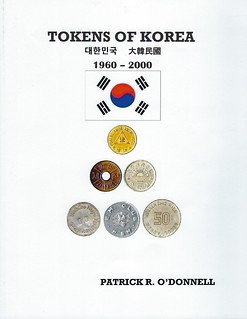
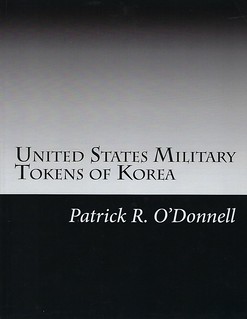
As a military token collector I find it a pleasure to review the books UNITED STATES MILITARY TOKENS OF KOREA ($29.99) and TOKENS OF KOREA ($8.95) by Patrick R. O'Donnell (Raleigh and Wilmington North Carolina), having begun my own quest into the history of military tokens at the age of 22, some fifty years ago, and having issued two catalogs on the subject on Vietnam military tokens myself. Actually, I spent more time in South Korea than I ever did in Vietnam. First in 1963 and 1964 when most South Koreans were still living in mud huts with thatched grass roofs, and US Army units were still adhering to Korean War regulations. I returned again for two more years in 1978 through 1980, and was there during the period when President Pak-Chung-Hui was assassinated. While the entire country was placed off-limits and citizens were restricted to their homes during President Pak's funeral, from my quarters I witnessed Pak's caisson and his interment procession cross the Han River Bridge to its final resting place. Yet, my understanding of the country of South Korea and my knowledge of South Korean military tokens pales in comparison to Patrick O'Donnell's knowledge of the history of the Korean peninsula and its inter-connection with South Korean exonumia.
I first met Pat O'Donnell when a group of us, stationed in Seoul, formed the Korean/American Numismatic Association in 1980. It was then that Pat's enthusiasm and knowledge about the tokens used by the military in South Korea first impressed me. I knew back then, that to be a cataloger of military related monies, one must have a background in insignia and heraldry, military lineage, order of battle, and boots on the ground knowledge of the locations that issued such pieces. Pat was eminently qualified in all of those areas. I realized that the monumental undertaking that he had laid out as his goal would not be an easy one, but 37 years later his 270 pages of research in two 8 by 10 volumes rose to the task, and is certainly a labor of love.
Well over 1,000 tokens are listed in his UNITED STATES MILITARY TOKENS OF KOREA (2017) while several hundreds more used by civilian franchises are cataloged in his TOKENS OF KOREA (2016). Clear, sharp, color photos are on every page of both of his catalogs, which are enhanced by his complete descriptions and explanations. Not only are slot machine tokens and credit checks cataloged, but so are challenge coins and U.S., allied, and unofficial medals. Pat doesn't leave the collector in the dark about prices, as he devotes five pages to listing accurate evaluations.
Historical descriptions are also abundant. One such example is:
K-10/Chinhae Air Base
K-10 was utilized during the war by the 12th Fighter-Bomber Squadron, the 75th Air Depot Wing which arrived from the United States in 1952 and the 67th Fighter-Bomber Squadron. The SAAF 2 Squadron from South Africa was also stationed there. After the war K-10 was returned to the control of the Korea government and it became a civilian airport.
Pat O'Donnell's footnotes, convey important military facts, such as that of Red Sox legend Ted Williams and his participation as a fighter pilot during the Korea War, which is the type of information that Pat weaves into his catalog. The book's dedication to Pat's long time friend CWO Leonard R. Weitzel, US Army 1912-2006 is both stirring and noteworthy.
Readers will see the two books appear as 100% complete and 99% accurate. When I mentioned what I perceived as one minor error, ASCOM standing for Army Service Command, I contacted Pat explaining that in 1963, I knew ASCOM as Area Support Command. He graciously came back to me with documentation proving me wrong, which simply proves that on the ground - even in the day, terminology could be incorrect. In the military, confusion could often be created by GIs when an error in designation was made and picked up by the next GI and carried forward. Pat didn't grope in the dark for answers to such quandaries, but rather went to the documented source in each case, which makes his catalog so perfect.
I can't say enough virtuous things about Pat O'Donnell's cataloging skills, but I don't have to. The highest compliment anyone could give about the two catalogs came from long time South Vietnam military token enthusiast Kevin Malloy, Tracy, California, who kindly put me back in touch with Pat after many years. Kevin's words were, "My interests have always been in South Vietnam military tokens up until now. That has changed for me since seeing the two O'Donnell catalogs. I am now on a new quest to collect South Korean tokens and have Pat O'Donnell to thank for that. He has brought our Korean War legacy, and that which has happened since, into clear numismatic focus.
Ray Bows is the author of IN HONOR AND MEMORY: INSTALLATIONS AND FACILITIES OF THE VIETNAM WAR. It is an 800 page hardbound book which lists and tells the stories of 3,600 locations named during the war in Vietnam. It is available by contacting Bows through his website bowsmilitarybooks.com , or by calling Ray at 386-566-2089.
Ray adds:
The books are easily available at amazon.com. The UNITED STATES MILITARY TOKENS OF KOREA has 215 pages, all color photos. and is priced at $29.95; TOKENS OF KOREA has 53 pages, all color, and is priced at $8.95.
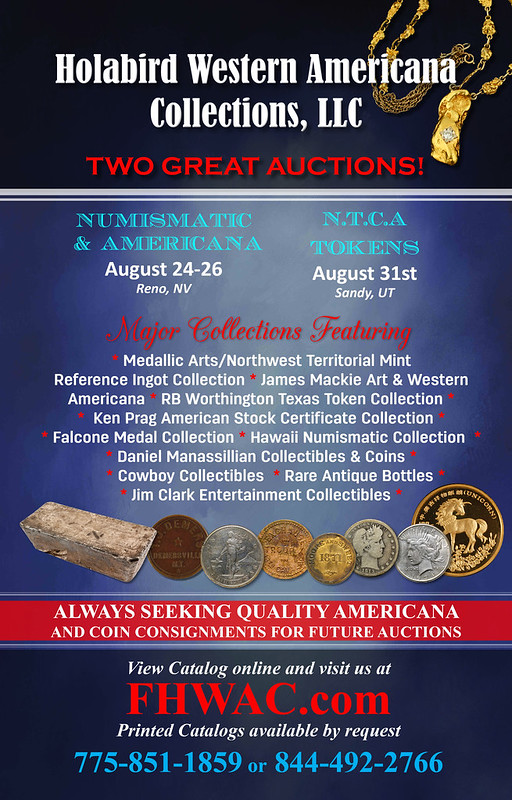
DON BAILEY (1933-2018)
Lou Golino published an article August 15, 2018 on Coin Update with news of the death of numismatic author Don Bailey. Here's an excerpt. -Editor
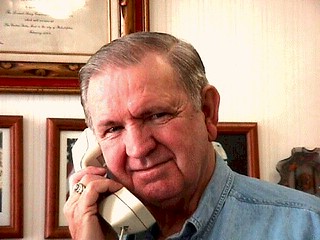 On August 10 the numismatic community lost one of its pioneers, Don Bailey, a prominent dealer and specialist in Mexican numismatics, who worked tirelessly to expand interest in this area of the hobby over the past half-century.
On August 10 the numismatic community lost one of its pioneers, Don Bailey, a prominent dealer and specialist in Mexican numismatics, who worked tirelessly to expand interest in this area of the hobby over the past half-century.
Born and raised in Michigan, Don left the state during the Korean War to join the U.S. Marine Corps. When he retired from the Marines, he was living in Yuma, Arizona, a state that borders Mexico. It was in Arizona that Don began his love affair with Mexican coins and the history behind them.
He began studying and writing about Mexican coins in the 1960s, writing articles that eventually appeared in every major numismatic publication as well as several award-winning books, including The Whitman Encyclopedia of Mexican Money – a multi-volume history of Mexican coinage since the pre-Columbian era that he wrote with his wife Lois.
He also wrote several books on Mexican coinage and contributed to various world coin reference books such as the Standard Catalog of World Coins and Standard Catalog of Mexican Coins – both published by Krause Publications.
Don was not only active in several numismatic associations and groups but also started the United States Mexican Numismatic Association in 1997 and another organization in the 1960s.
To read the complete article, see:
Don Bailey, dean of Mexican numismatics, has passed away
(http://news.coinupdate.com/don-bailey-dean-of-mexican-numismatics-has-passed-away/)
RESEARCHERS PUT EARLY SILVER COINS TO NEW TESTS
Newman Numismatic Portal Project Coordinator Len Augsburger provided the following report about new research sponsored by the Eric P. Newman Numismatic Education Society (EPNNES). Thanks. -Editor
Early U.S. Mint Research Sponsored by Eric P. Newman Numismatic Education Society
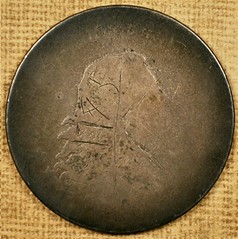
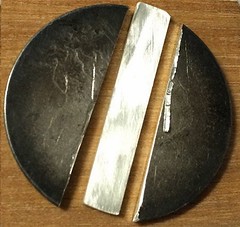
Before and after pictures of a 1795 O-105 Half Dollar. The center piece in the after picture was sent for ICP-AES analysis.
At the John Reich Collectors Society meeting held August 15 at the ANA convention in Philadelphia, researchers David Finkelstein and Chris Pilliod presented preliminary results on composition testing of United States 1794 and 1795 coinage. At issue was the question of whether David Rittenhouse, Mint Director, sanctioned the manufacture of silver coinage outside the legal standard. The Mint Act of 1792 mandated an 89.24% standard, but Albion Cox, the melter and refiner, recommended a 90% standard, as coinage with a higher proportion of copper tended to turn black. Interestingly, the annual assay tests of 1795 and 1796 (for coinage for 1794 and 1795, respectively) are unrecorded in the archives.
Finkelstein and Pilliod noted the shortcomings of XRF (X-ray fluorescence) testing, which supplies data that is only “skin deep” – about ten microns below the surface. Instead, they arranged for ICP-AES (inductively coupled plasma atomic emission spectroscopy) testing of cut coinage samples. Quoting from Wikipedia, ICP-AES “is an analytical technique used for the detection of chemical elements. It is a type of emission spectroscopy that uses the inductively coupled plasma to produce excited atoms and ions that emit electromagnetic radiation at wavelengths characteristic of a particular element. It is a flame technique with a flame temperature in a range from 6000 to 10000 K. The intensity of this emission is indicative of the concentration of the element within the sample.”
Pilliod and Finkelstein tested eight silver pieces (one 1794 half dollar and seven 1795 half dollars). Due to the value of the coins, low grade and problem pieces were selected for destructive testing. The 1794 was particularly worn, what Sheldon would have called “basal state,” and was donated by the Terry Brand estate, which recently sold a large group of 1794 half dollars through Heritage Auctions. The Eric P. Newman Numismatic Education Society (EPNNES) sponsored the acquisition of other coins.
Each piece was sliced into three sections and polished, resulting in small mirrorlike fragments that were then subjected to ICP-AES. Complete statistical analysis is not complete, but preliminary results suggest that, with a high degree of confidence, 1795 silver coinage was indeed struck to a higher standard than that required by law. Chris Pilliod and David Finkelstein will publish full results in due course, and we look forward to studying the complete findings. Mint Director David Rittenhouse was a careful, precise, and rigorous scientist, and, and David Finkelstein likes to say, “there are no coincidences” in numismatic research.
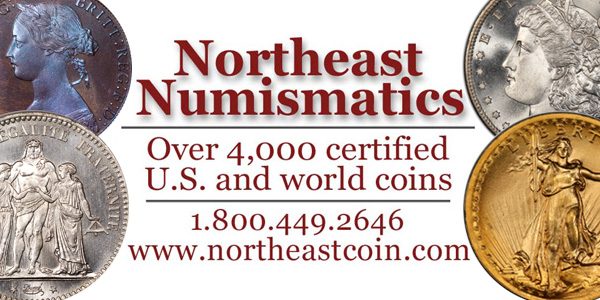
NOTES FROM E-SYLUM READERS: AUGUST 19, 2018
Query: Library Program Suggestions Sought
Bruce Perdue writes:
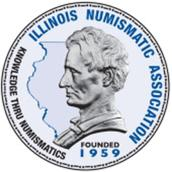 I am taking over the Illinois Numismatic Association Library project in September. Currently ILNA sends out numismatic books to about 75 of the over 600 libraries in Illinois each year. ILNA has been sending out a variety of books purchased from Whitman. We have an inventory of 72 2010 Blue books which are so out of date that I intend to give them away at our show in September. We also have a number of history books by year that are not numismatic at all and frankly I doubt that libraries would shelve them.
I am taking over the Illinois Numismatic Association Library project in September. Currently ILNA sends out numismatic books to about 75 of the over 600 libraries in Illinois each year. ILNA has been sending out a variety of books purchased from Whitman. We have an inventory of 72 2010 Blue books which are so out of date that I intend to give them away at our show in September. We also have a number of history books by year that are not numismatic at all and frankly I doubt that libraries would shelve them.
I am looking for suggestions on how to make the program more effective/useful to libraries and their patrons. My hope is that some of the E-Sylum readers might have a good idea. I am considering sending a new Red Book annually to all 600 plus libraries or if that proves too costly send half of the list a new Red Book every other year. I have spoken to several different libraries in my area and am soliciting their ideas as well.
Great project - I wish more state and local numismatic organizations had programs like this. What do readers think? My two cents would be to include some books with a numismatic connection to local history. If Civil War tokens were issued there, donate an old edition of the storecard book; if National Bank Notes were issued, include one of those books. Just be sure to point out the connections to the local librarians. Maybe they'll let you prepare a slip to be inserted inside - "Check here for items of local interest." -Editor
For more information about the Illinois Numismatic Association (ILNA), see:
http://www.ilnaclub.org/
Ordering Chinese Book Editions
Jon Radel submitted these notes on how to order your very own copy of the Chinese edition of Collecting World Coins. -Editor
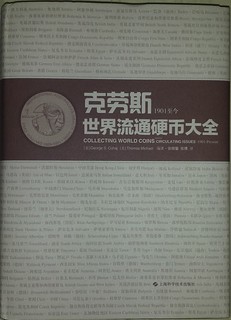 If you want to acquire a copy of 克劳斯世界流通硬币大全 (1901至今), otherwise known as the Krause World Circulation Coin Encyclopedia (1901 to present), it's really not that difficult to just import your own copy. Otherwise known as: You really shouldn't underestimate what Amazon can do for you.
If you want to acquire a copy of 克劳斯世界流通硬币大全 (1901至今), otherwise known as the Krause World Circulation Coin Encyclopedia (1901 to present), it's really not that difficult to just import your own copy. Otherwise known as: You really shouldn't underestimate what Amazon can do for you.
It's been a bit, but I've had no issue with ordering books from amazon.cn in the past. Books are frequently relatively cheap, but the postage can more than make up for that. There are a few minor wrinkles, particularly if you don't read Chinese. Unlike the European Amazon sites, your US Amazon login is not recognized at amazon.cn, so you have to open a new account there. Also my experience has been that the Amazon Marketplace vendors generally (always?) won't ship to the US, so you can purchase directly from Amazon only. But the layout of the site is similar to that of all the other Amazon properties, so between that and using Google Translate (or just use their Chrome browser that has translation built in) I've never been more than mildly confused. It looks like there's even an "In English" button on the site that's new since the last time I ordered a book, though only parts of the site are available in translation.
Start at
https://www.amazon.cn/dp/B07CPJZ37D/ref=sr_1_1?ie=UTF8&qid=1534132118&sr=8-1&keywords=9787547836712
or just search for the ISBN. ?270.40 for the book, and I'm offered standard air shipping to the US for ?110.00, which gives a total of roughly US$58 on a credit card.
To read the earlier E-Sylum article, see:
NEW BOOK: COLLECTING WORLD COINS CHINESE EDITION
(http://www.coinbooks.org/v21/esylum_v21n32a06.html)
Query: Niagara Falls on British Token
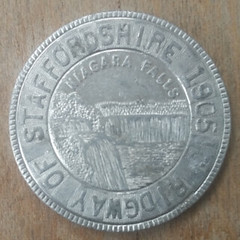
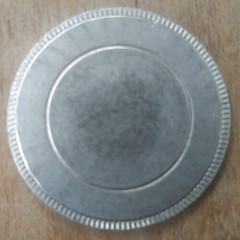
David Pickup writes:
This is a new mystery for readers! I attach photos of an aluminium token with Ridgway of Staffordshire 1905 on it. The other side is blank apart from circles. What is the connection between Niagara Falls and a British pottery company?
Great question! Can anyone help with this? Here's what I'm thinking, but I have no idea if this is right. A web search found plates by Ridgway with a Niagara Falls pattern. Is this token advertising a line of dinnerware? -Editor
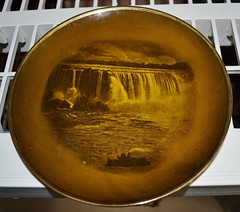
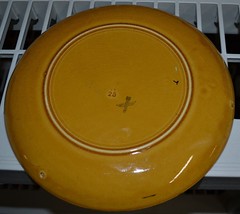
To read the complete eBay lot description, see:
BEAUTIFUL EARLY RIDGWAY NIAGARA FALLS SEPIA PLATE
(ebay.com/itm/BEAUTIFUL-EARLY-RIDGWAY-NIAGARA-FALLS-SEPIA-PLATE-/161296882955)
Query: Striking Pressure For U.S. Coins
John Regitko
of Toronto, Canada writes:
In the last issue of The E-Sylum, it states: "It takes between 35 and 200 tonnes of pressure to strike coins and this varies with each coin denomination and if it is a proof coin or a circulation strike," according to the Australian Mint.
In the 1970s and 1980s, the pressure in striking coins at the Royal Canadian Mint in Ottawa was between 200 tons and 300 tons when "mechanical" presses were in use. The exact tonnage depended on the denomination, size, metallic content and quality. This information was provided to me by the then Vice-President - Manufacturing. Since the U.S. Mints and the Canadian Mint used the same presses, this would also have applied in the U.S.
I don't know what it is today, because the Royal Canadian Mint is very tight lipped about questions I keep asking. Their response is usually that it is "proprietary information" even though I have found details on the world's best, although not most accurate, encyclopedia known as the Internet. Does anyone know what it is today in the U.S.?
Great question. Does anyone know? -Editor
To read the earlier E-Sylum article, see:
DIE ADJUSTMENT STRIKES
(http://www.coinbooks.org/v21/esylum_v21n32a13.html)
Georgia Numismatic Association Exhibits
Clay Barrineau writes:
Thank you so much for helping out with my exhibit at this year's GNA. The image of the Fulton Co-Op receipt (Atlanta Labor Exchange) you sent me from Eric Schena's collection was a great addition for my new Atlanta Labor Exchange Exhibit. It helped me secure 3rd place (large category, > 3 cases) which is great for a first time exhibit entry. I also got a first place (small category, <= 3 cases), and my kids snagged a 2nd and 3rd place in the Junior category...
E-Sylum readers are always glad to help. Here are some photos Clay included, and for a look at Clay's Georgia paper money collection, see this week's Featured Web Site article. -Editor
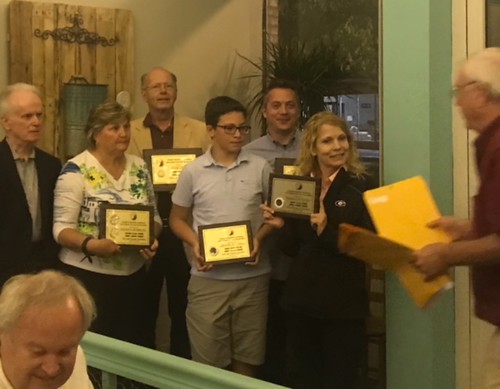
Clay and Youngest son at GNA awards dinner
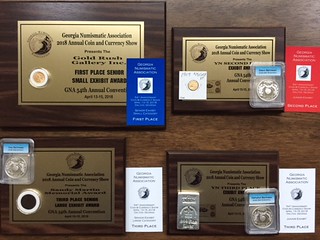
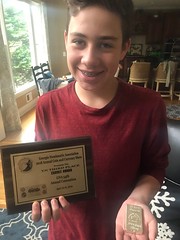
Left: Barrineau Family exhibit award plaques
Right: Clay's oldest son with award plaque
To read the earlier E-Sylum article, see:
NOTES FROM E-SYLUM READERS: JANUARY 21, 2018 : 1893 Atlanta Clearing House Note Sought
(http://www.coinbooks.org/v21/esylum_v21n03a15.html)
THOUGHTS ON MICRO-ENGRAVED BANKNOTES
Ron Haller-Williams submitted these thoughts on the micro-engraved £5 and £10 banknotes. Thanks. -Editor
I think it might be worth taking a close look at what is actually called the Currency and Banknotes Act 1928, specifically Section 12:
12 Penalty for defacing bank notes.
If any person prints or stamps, or by any like means impresses, on any bank note any words, letters or figures, he shall, in respect of each offence, be liable on summary conviction to a penalty not exceeding ...
... one pound. (as originally enacted)
... level 1 on the standard scale. (as it currently stands)
The penalty was changed to 25 pounds by s.31(5) & (6) of the Criminal Law Act 1977, and to 200 pounds by s.37 and s.46(2) of the Criminal Justice Act 1982.
So this is a very specific type of defacement, but something handwritten (e.g. slogans - or numbers representing how many notes are still in the group, as I remember used to be the habit of sellers) is NOT covered by this.
And it could be argued that even machine engraving, or something "written" with a computer-driven plotter, is equally not covered by this, since it isn't "printing or stamping, or impressing by any like means", therefore not an offence (under THIS Act, at any rate).
I AM NOT A LAWYER, but do I feel confident in stating this, even though the Bank of England claim, at
https://www.bankofengland.co.uk/banknotes/using-images-of-banknotes
"It is illegal to deface our banknotes, for example by printing or writing on them. This is an offence under the Currency and Banknotes Act 1928."
with a link to the section of the Act, at
http://www.legislation.gov.uk/ukpga/Geo5/18-19/13/section/12
This was reiterated by "a Bank of England spokeswoman" at
https://www.independent.co.uk/news/people/piers-morgan-five-pound-note-did-he-break-the-law-good-morning-britain-tears-up-rips-money-tv-video-a7244906.html
"Under the Currency & Banknotes Act 1928 it is illegal to deface banknotes by printing, writing or impressing upon them words, letters or figures."
https://www.thestudentroom.co.uk/showthread.php?t=1791046
has a variety of comments, some less authoritative than others:
"... you often see money with bits of writing on them. I think there's a limit but a name or a few words is fine." "Bank clerks regularly write on piles of notes after counting a load off."
"Have you never received a note with writing on it? Where the shop keeper has scribbled numbers, or names. I received a note before with a poem written on for Caroline..."
"I work in a shop and I think nothing of taking notes that have been written on, and I think everyone (my managers included) would think I was a bit of an idiot if I attempted to refuse them."
While checking this, I also found:
https://4.bp.blogspot.com/-bcjgUwZqUrs/TbBH_cqUsRI/AAAAAAAAAtg/
29H7tEf9xZ8/s1600/Lioncash.jpg
( from
https://www.thestudentroom.co.uk/showthread.php?t=1791046
)
A "Spocked" Canadian $5 at
https://www.bbc.co.uk/news/world-us-canada-31717210
https://news.bbcimg.co.uk/media/images/81372000/
jpg/_81372893_b_ivlqbu0aesbph.jpglarge.jpg
and the rather interesting saga at
https://fatprosemattrose.wordpress.com/tag/writing-on-money/
and too many more for this piece to hold.
Of course, Robert Burns' "Lines Written on a Banknote" was done in 1786, long before any such Act!
http://www.traditionalmusic.co.uk/robert-burns-lyrics/pdf/lines-written-on-a-banknote.pdf
https://www.bbc.co.uk/programmes/p03zspxb
http://www.robertburns.org/works/125.shtml
Wae worth thy power, thou cursed leaf! Fell source o' a' my woe and grief! For lack o' thee I've lost my lass! For lack o' thee I scrimp my glass! I see the children of affliction Unaided, through thy curst restriction: I've seen the oppressor's cruel smile Amid his hapless victim's spoil; And for thy potence vainly wished, To crush the villain in the dust: For lack o' thee, I leave this much-lov'd shore, Never, perhaps, to greet old Scotland more.
As it says at
https://www.exeter.ox.ac.uk/burnss-immortal-memory-celebrated-at-exeter-college/
"He had planned to flee his debts and abandon Jean Armour by going to the West Indies to oversee work on a plantation, and had actually recorded his feelings in Lines Written On A Banknote in 1786. Instead he went straight to Edinburgh, where he was hosted by all the gliterati and nobles of the time, including the Select Society of which he became a member."
There is also a reasonable amount of useful info (including that it was a Bank of Scotland 1 guinea note) at
https://www.lloydsbankinggroup.com/our-group/our-heritage/timeline/1695-1800/
By the way, I'd very much like to know it that banknote, or an image of it, survives!
That would be amazing! Readers - is anyone aware of the existence of the Burns note? -Editor
To read the earlier E-Sylum articles, see:
IN OTHER NEWS: AUGUST 5, 2018 : Graham Short Releases Another Micro-Engraved
(http://www.coinbooks.org/v21/esylum_v21n31a46.html)
ARTIST GRAHAM SHORT GOT BANK OF ENGLAND OK
(http://www.coinbooks.org/v21/esylum_v21n32a30.html)
ON THE PENNSYLVANIA FIRST DEFENDERS MEDAL
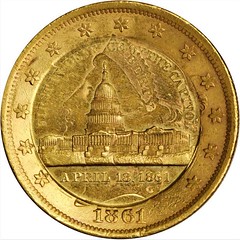
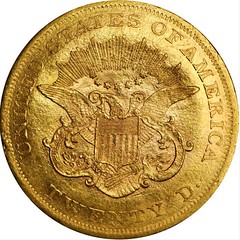
Regarding the Pennsylvania First Defenders medal, Gary Greenbaum writes:
I would expect that Oliver Bosbyshell, Superintendent of the Philadelphia Mint from 1889 to 1894, was involved with the medal (struck on a double eagle), which was produced in 1891. He was one of the First Defenders, and was very active in the post-Civil War veteran organizations such as the Grand Army of the Republic. He also at one time sold a large collection of pattern coins accumulated during his earlier term as Chief Coiner, and knew which end of a coin was up, numismatically. At the very least, he'd be able to get his hands on an 1861 double eagle, and know who to approach among Philadelphia's private engravers and jewelers to have the work done.
Thanks. Gary also provided this link to a Wikipedia article on Bosbyshell. -Editor
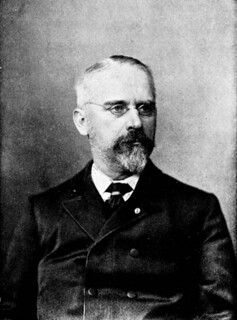 Oliver Christian Bosbyshell (January 3, 1839 – August 1, 1921) was Superintendent of the United States Mint at Philadelphia from 1889 to 1894. He also claimed to have been the first Union soldier wounded by enemy action in the Civil War, stating that he received a bruise on the forehead from an object thrown by a Confederate sympathizer while his unit was marching through Baltimore in April 1861.
Oliver Christian Bosbyshell (January 3, 1839 – August 1, 1921) was Superintendent of the United States Mint at Philadelphia from 1889 to 1894. He also claimed to have been the first Union soldier wounded by enemy action in the Civil War, stating that he received a bruise on the forehead from an object thrown by a Confederate sympathizer while his unit was marching through Baltimore in April 1861.
Bosbyshell was born in Mississippi. His parents were of old Philadelphia stock, and he was raised in Schuylkill County, Pennsylvania. After briefly working on the railroad and then studying law, Bosbyshell enlisted in the Union cause on the outbreak of war. Following a brief period of service in the 25th Pennsylvania Volunteer Regiment, he joined the 48th Pennsylvania, remaining in that regiment for three years. He saw action in such battles as Second Bull Run and Antietam.
To read the complete article, see:
Oliver Bosbyshell
(https://en.wikipedia.org/wiki/Oliver_Bosbyshell)
To read the earlier E-Sylum article, see:
STACK'S BOWERS AUGUST 2018 AUCTION SELECTIONS : "1861" (1891) State of Pennsylvania First Defenders Medal of Honor Obverse Struck on an 1861 Liberty Head Double Eagle
(http://www.coinbooks.org/v21/esylum_v21n32a24.html)

DISCOVERY SPECIMEN 1943 BRONZE CENT GRADED
This press release from NGC concerns the discovery specimen of one of the top U.S. coin errors, the 1943 bronze cent. We discussed this piece last month; see the earlier E-Sylum articles for additional context. -Editor
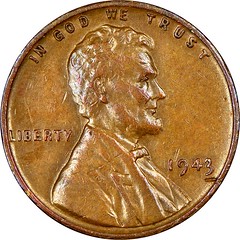
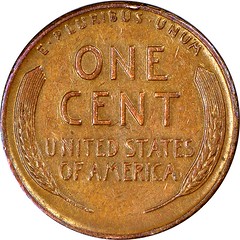
Numismatic Guaranty Corporation® (NGC®) has certified the most famous of all mint errors: the Don Lutes, Jr. Philadelphia 1943 Bronze Cent. This legendary coin was the first discovery of a 1943 bronze cent, which is considered by many to be the King of Mint Errors.
The Lutes specimen is now graded NGC AU 53 BN and will be on display at the ANA World's Fair of Money in Philadelphia, August 14-17, 2018.
All 1943 cents were supposed to have been struck on zinc-coated steel planchets to save precious copper for more critical wartime production needs. In prior years, cents were struck on planchets made of bronze (95% copper and 5% zinc).
Before long, rumors circulated that Ford Motor Company would offer a new car in exchange for a copper penny dated 1943. This bit of whimsy had an unanticipated effect: in 1947, a newspaper reported that someone had indeed found a 1943 cent coined in bronze: 16-year-old Donald Lutes, Jr. of Pittsfield, Massachusetts. Lutes, a coin collector himself, had found his example in change from the school cafeteria.
While the numismatic community debated the merits of the Lutes report, the placement of another 1943 bronze cent at the 1958 ANA convention auction (this one discovered by Marvin Beyer sometime after the Lutes discovery) received nationwide attention. The interest only increased after Beyer pulled his coin from the sale at the last minute, which resulted in a lawsuit.
This media attention prompted Lutes to seek confirmation of his coin's genuineness. He loaned it to prominent numismatic researcher and authenticator Walter Breen in 1959, and Breen declared unhesitatingly that the cent was real.
Over the years since 1947 the legend of Lutes' 1943 bronze cent has only grown. It was never offered for sale, and the numismatic community was not able to see this amazing specimen until recently. Now elderly and living in a nursing home, Lutes has finally decided to pass on his prized discovery coin to a new owner: the coin, now certified by NGC, will be sold by Heritage Auctions.
A lustrous and glossy brown, the Lutes Discovery Specimen is just faintly worn and is among the more attractive of the 17 Philadelphia 1943 bronze cents that have since been confirmed. The NGC certification label features the pedigree “Don Lutes, Jr. Discovery Specimen,” preserving this coin's important place in numismatic history.
“Like so many other young coin collectors growing up in the 1970s, there was always the dream of finding a 1943 copper cent,” said David J. Camire, NGC Grading Finalizer and a mint error expert. “This coin, for me, is certainly the 'Holy Grail' of mint errors. Rarely today does a discovery piece come to market, after all these years, still in the possession of the original owner. A 'dream coin' to many, soon someone will become only the second owner of this legendary rarity.”
To read the complete article, see:
NGC Certifies the King of Mint Errors
(https://www.ngccoin.com/news/article/6773/1943-cent-lutes-discovery/)
To read the earlier E-Sylum articles, see:
MORE BREEN AND TAXAY AUTHENTICATION CERTIFICATES
(http://www.coinbooks.org/v21/esylum_v21n28a12.html)
BEARDLESS BREEN ON RADIO WITH 1943 BRONZE CENT
(http://www.coinbooks.org/v21/esylum_v21n30a08.html)
VOCABULARY TERM: COMPUTER ENGRAVING
Dick Johnson submitted this entry from his Encyclopedia of Coin and Medal Terminology. Thanks. -Editor
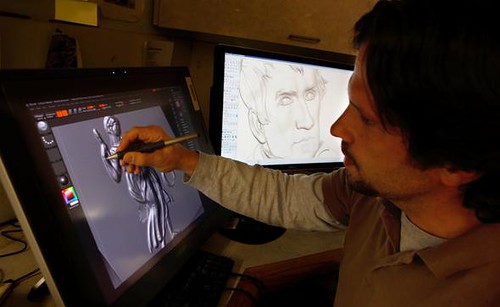
Hired in 2005, Joseph Menna was the first artist employed by the U.S. Mint as a computer specialist for its engraving staff.
Computer Engraving. Creating an image in varying depths digitally on a computer which establishes the controls for the milling of these depths in a die or hub. While computer engraving is a new tool in the hands of the coin and medal engraver the computer will not design a coin or medal. But like a burin in the hand of the engraver, it will aid the engraver to enter the design in MODULATED RELIEF by determining the amount of depth each point should cut into the die or matrix.
Mints and medalmakers around the world were eager to accept the new technology, the most recent step in replacing the tedious act of hand engraving dies, as old as coins themselves. The advantages of computer engraving is not only “fast and cheap” but also its versatility to alter a design, to modify it, to test a new concept, to hone the relief to a satisfactory image. As such it is ideal for quickly developing a design in contrast to previous “clay and plaster” technology.
Computer engraving language. Like any specialized methodology, engraving by computers has its own terminology. While sculptors create three dimensional relief design by carving and modeling computer engravers design with X, Y, and Z coordinates. The term for computer relief, as well as this class of engraved dies, is called “3D” for the rise and fall of the modulated design in three dimensions. New terms describe similar previous methods. What the hand engraver or modeler called PROVING the computer artist, for example, calls digital elevation model (DEM). Here are the most used digital terms.
Computer Engraving Terms
2D – Two dimension, FLAT ENGRAVING
2.5D – Two and a half dimensions, flat design on 3 planes
3D -- Three dimensional, free-form sculpture surface MODULATED RELIEF.
CAD – Computer Aided Design
CAD-CAM – Computer Aided Design plus Computer Aided Manufacturing.
VS – Virtual Sculpturing
VS3D –Virtual Sculpturing in three dimensional free-form modulated relief
CNC—Computer Numeric Control
G-Code – Standard numerical language
DEM – Digital Elevation Model, an image with considerable formation of the design.
RP – Rapid Phototyping, a method of quickly viewing a scale model.
TIF – Tagged Image File, a formal digital image.
X, Y, Z Coordinates – a design's height (X), width (Y), and depth (Z) in a die, hub or matrix.
pixel – aa individual dot in a computer image.
tool path –track of a milling tool controlled by computer instructions
bitmap –- a digital image composed of a marix of dots.
visual feedback – appearance of the design viewed by a human, virtual reality.
hammer blow – movement of the Z coordinate in forming a design.
touch-probe digitizer –a tool to alter one or more coordinates in a design.
Computer engraving technique.The computer engraver starts with a scan of a flat drawing, a CARTOON, or creates this on the screen. At each point on the two-dimensional design, called a pixel, X and Y coordinates are determined by the computer. The operator chooses the depth at this point, the Z coordinate. This fixes the sculptural or dimensional effect, the depth of the relief – to form the height in the die – the depth of the Z coordinate. An individual move to lower this point is called a “hammer blow.” All three coordinates for that point are stored in the software, forming a bitmap.
A visual image is shown on the screen of the CPR at all times. The operator moves through the design creating the modulated relief using a special tool, a touch-probe digitizer. A rapid phototype (RP) image can be obtained at any time.
The finished and approved design fixed in the software will then be transferred to a milling machine which does the cutting as controlled by the digital file. Afterwards, burrs and rough corners from the milling tool must be worked as with any other TOUCHUP of dies.
Status. Not all sculptor modellers have embraced the new computer engraving technology. Perhaps like the reaction of hand engravers to machine engravers when these were introduced in previous years, it took time to prove a new technology. Critics of computer engraving cite three shortcomings: micro modelling with the computer, portrait realism, and crispness of detail. Modellers in clay or wax can apply larger areas of a design at one time, while computer modelling is limited to a single point.
Critics say computer generated portraits are stiff, frozen and lifeless. They would still prefer sculptors working in clay or wax to vivify a portrait making it more realistic and lifelike. In art vivify means “give life to.” Since most viewers prefer highly detailed designs with sharp edge relief, this can be obtained in both old and new methods, However it requires repeated cutting a second or third time with finer cutting points in the milling operation, somewhat more difficult with the new method.
Both technologies, however, have their place in the field and will continue to be employed in the minting industry. But most important it can be said: just as the old technology did not replace the artist, neither will the new.
CLASS 04.3
Looking for the meaning of a numismatic word, or the description of a term? Try the Newman Numismatic Portal's Numismatic Dictionary at: https://nnp.wustl.edu/library/dictionary
Or if you would like a printed copy of the complete Encyclopedia, it is available. There are 1,854 terms, on 678 pages, in The Encyclopedia of Coin and Medal Technology. Even running two a week would require more than 19 years to publish them all. If you would like an advance draft of this vital reference work it may be obtained from the author for your check of $50 sent postpaid. Dick Johnson, 139 Thompson Drive, Torrington, CT 06790.
TRUMAN BISHOP DISNEY (1829-1884)
Truman Bishop Disney (1829-1884), was born on April 29, 1829, son of William Disney (1781-1850), and Julia Flint Thatcher (1782-1831), at Cincinnati, Ohio.
In the Williams Cincinnati City Directory of 1853 he is listed as a commercial merchant and partner in E. B. Townsend & Company with B. T. Edmund, 18 West Front Street, Cincinnati.
In 1856, he married Laura Rebecca Tift (1833-1921). They had two children : a daughter Cora Thatcher Disney (1857-1873), and a son William Bishop Disney (1859-1890).
From 1859-1884, he served as the Clerk and Collector of the Board of Directors of the University of Cincinnati.
Disney was one of Cincinnati's well noted coin collectors and is listed in the Centennial History of Cincinnati.
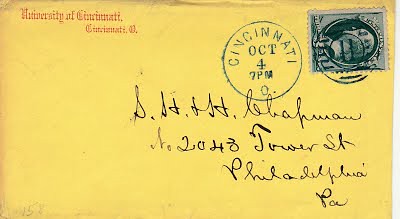
There are several pieces of correspondence between Disney and the Chapman Brothers in the Lupia Numismatic Library, Special Collection, The Chapman Family Correspondence Archive.
He suffered a protracted illness and died on August 24, 1884, at Cincinnati. He is buried in Spring Grove Cemetery, Cincinnati, Ohio.
To read the complete article, see:
DISNEY, TRUMAN BISHOP
(https://sites.google.com/a/numismaticmall.com/www/numismaticmall-com/disney-truman-bishop)
The entire inventory of the Lupia Numismatic Library is for sale. Individual items will be available before the remaining archives are broken up into parcels sold at philatelic auctions in the U. S. and Hong Kong. Check NumismaticMall.com frequently as dozens of new items with estimates will be posted daily until everything is sold.
All inquiries will be given prompt and courteous attention. Write to: john@numismaticmall.com .
2018 PROFESSIONAL NUMISMATISTS GUILD AWARDS
The Professional Numismatists Guild (PNG) issued this press release on their 2018 annual awards banquet. Congratulations to the award winners! -Editor
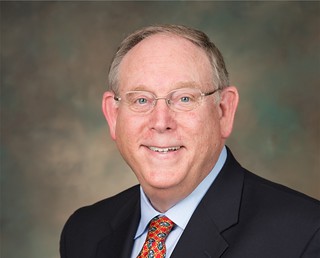 The Professional Numismatists Guild (www.PNGdealers.org) presented its 2018 PNG Lifetime Achievement Award to Donn Pearlman, an award-winning numismatic writer, public relations counselor and a former Chicago radio and television broadcaster. The honor was announced during the PNG's annual awards banquet held this year in Philadelphia, Pennsylvania on August 13.
The Professional Numismatists Guild (www.PNGdealers.org) presented its 2018 PNG Lifetime Achievement Award to Donn Pearlman, an award-winning numismatic writer, public relations counselor and a former Chicago radio and television broadcaster. The honor was announced during the PNG's annual awards banquet held this year in Philadelphia, Pennsylvania on August 13.
President of Donn Pearlman & Associates in Las Vegas, Nevada, he has helped generate positive national and international headlines about the hobby and profession for almost five decades. A collector since the age of eight, Pearlman serves as the PNG's publicist and is a former member of the American Numismatic Association Board of Governors.
Here are the other 2018 PNG awards and winners announced at the banquet.
The Robert Friedberg Award for an outstanding book or other literature was presented to author Don C. Kelly for Obsolete Paper Money – A Guide With Prices, published by The Paper Money Institute, LLC, Oxford, Ohio, 2018. The Sol Kaplan Award, which recognizes efforts and contributions in combatting crimes against the numismatic community and is jointly presented by the PNG and the Lewis M. Reagan Foundation, was given to Richard Weaver of Delaware Valley Rare Coin in Broomall, Pennsylvania.
Weaver's crucial work with the Industry Council for Tangible Assets' Anti-Counterfeiting Task Force, Homeland Security, Customs and Border Protection, and the Bureau of Alcohol, Tobacco, Firearms and Explosives led to the successful apprehension of a suspect in New Jersey who was allegedly involved in the illegal importation and sale of counterfeit coins and ingots as well as counterfeit certification service holders. It is estimated that if the now confiscated items had been sold to unsuspecting retail customers they would have had a value of more than $48 million.
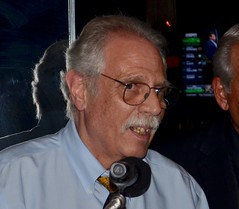
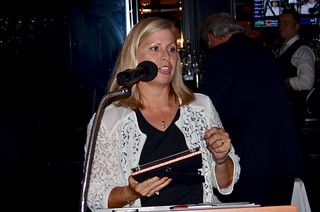
Terranova and McFadden Accepting Awards
ICTA Executive Director Kathy McFadden received the Significant Contribution Award. It is given to those who have made exceptional, beneficial efforts over the years on behalf of PNG and the profession and added to the hobby. McFadden is a national leader in seeking fair legislative and regulatory authority in the marketplace as well as in the fight against counterfeits.
Anthony Terranova of New York received the Art Kagin Ambassador Award. This award is named after a former PNG President who provided distinguished service as an advocate of numismatic goodwill.
Charles “Charlie” Browne of New Hampshire, who passed away in May, was posthumously honored with the Abe Kosoff Founders Award. The Kosoff Award is presented to a PNG member-dealer with steadfast dedication to the entire numismatic community and who has made a significant contribution to the Guild or to the numismatic fraternity.
Seven veteran dealers were recognized for 25 years of membership in the PNG: Kathleen Duncan; Richard K. Duncan, Sr.; Michael Fuljenz; Todd Imhof; Dwight Manley; Maurice Rosen; and Glenn Schinke.
To visit the PNG web site, see:
https://pngdealers.org/
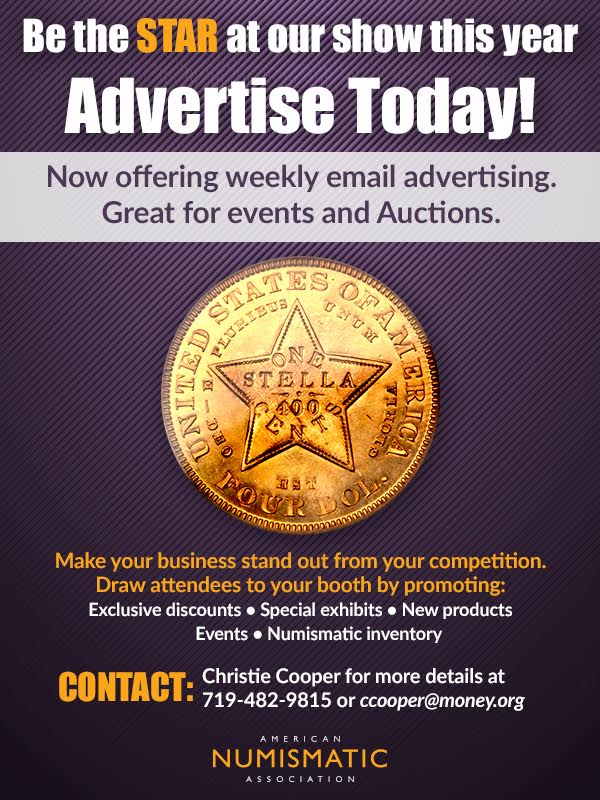
2019 AMERICA THE BEAUTIFUL QUARTER DESIGNS
The U.S. Mint published this press release August 14, 2018 announcing the 2019 America the Beautiful Quarter designs. I added images from the Mint web site. -Editor
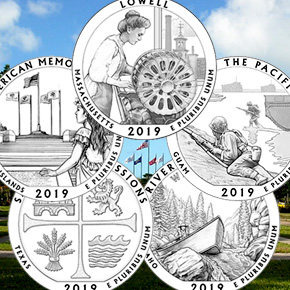 The United States Mint revealed the official designs for the 2019–dated coins in the America the Beautiful Quarters® Program today. The designs were unveiled at the American Numismatic Association's World's Fair of Money in the Philadelphia Convention Center.
The United States Mint revealed the official designs for the 2019–dated coins in the America the Beautiful Quarters® Program today. The designs were unveiled at the American Numismatic Association's World's Fair of Money in the Philadelphia Convention Center.
Designers in the Mint's Artistic Infusion Program (AIP) created the new designs which will be displayed on the reverse (tails side) of quarters honoring Lowell National Historical Park (Massachusetts), American Memorial Park (Commonwealth of the Northern Mariana Islands), War in the Pacific National Historical Park (Guam), San Antonio Missions National Historical Park (Texas), and Frank Church River of No Return Wilderness (Idaho). The designs were sculpted by the Mint's Sculptor-Engravers.
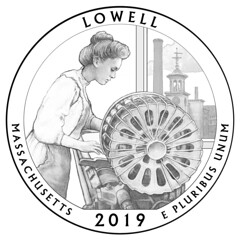 Lowell National Historical Park
Lowell National Historical Park
This design depicts a mill girl working at a power loom with its prominent circular bobbin battery. A view of Lowell, including the Boott Mill clock tower, is seen through the window. Inscriptions are “LOWELL,” “MASSACHUSETTS,” “2019,” and “E PLURIBUS UNUM.”
This design depicts a young Chamorro woman in traditional dress at the front of the Flag Circle and Court of Honor. She is resting her hand on the plaque whose text honors the sacrifice of those who died in the liberation of Saipan. Inscriptions are “AMERICAN MEMORIAL PARK,” “N. MARIANA ISLANDS,” “2019,” and “E PLURIBUS UNUM.”
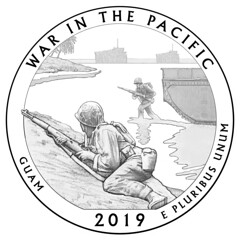 War in the Pacific National Historical Park
War in the Pacific National Historical Park
Designer: Joel Iskowitz Sculptor-Engraver: Michael Gaudioso This design portrays American forces coming ashore at Asan Bay, strengthening the number of troops on the island in the fight for Guam and its eventual liberation. Inscriptions are “WAR IN THE PACIFIC,” “GUAM,” “2019,” and “E PLURIBUS UNUM.”
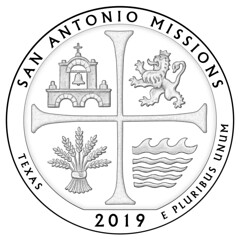 San Antonio Missions National Historical Park
San Antonio Missions National Historical Park
This design depicts elements of the Spanish Colonial Real coin to pay tribute to the missions. Within the quadrants are symbols of the missions: wheat symbolizes farming, the arches and bell symbolize community, a lion represents Spanish cultural heritage, and a symbol of the San Antonio River represents irrigation methods and life-sustaining resources. Inscriptions are “SAN ANTONIO MISSIONS,” “TEXAS,” “2019,” and “E PLURIBUS UNUM.”
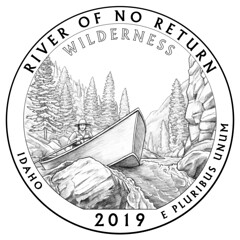 Frank Church River of No Return Wilderness
Frank Church River of No Return Wilderness
This design depicts a piloted drift boat on the rushing river encompassed by the trees and rock formations of the Wilderness. Inscriptions are “RIVER OF NO RETURN,” “WILDERNESS,” “IDAHO,” “2019,” and “E PLURIBUS UNUM.”
The obverse (heads) of the 2019 quarters will continue to feature the restored 1932 portrait of George Washington by sculptor John Flanagan. Required obverse inscriptions are “UNITED STATES OF AMERICA,” “LIBERTY,” “IN GOD WE TRUST,” and “QUARTER DOLLAR.”
2019 will mark the 10th year of the America the Beautiful Quarters® Program, which is authorized by Public Law 110-456—the America's Beautiful National Parks Quarter Dollar Coin Act of 2008 (Act). The Act directs the Mint to design, mint, and issue quarter-dollar coins emblematic of a national park or other national site in each state, the District of Columbia, and the five U.S. territories. As stipulated by the Act, the Mint is issuing five new quarters per year until 2020. The quarters will be issued in the order in which each honored site was first established. The final coin will be released in 2021.
To read the complete press release, see:
United States Mint Lifts the Curtain on Designs for the 2019 America the Beautiful Quarters Program
(https://www.usmint.gov/news/press-releases/mint-lifts-curtain-on-designs-for-2019-america-the-beautiful-quarters-program)
MOLDOVA'S COLLECTIVE "JIGSAW PUZZLE" COIN DESIGNS
Regarding the Royal Mint's collective "shield" reverse designs, Pabitra Saha writes:
The reverse designed by Mathew Dent has become popular as a "Jigsaw puzzle" design and a few countries like France etc have designed their commem coins with that design philosophy.
Moldova, recently announced their new circulation series with jigsaw design on both obverse as well as reverse.
Interesting. Here are images Pabitra included. Thank you! -Editor
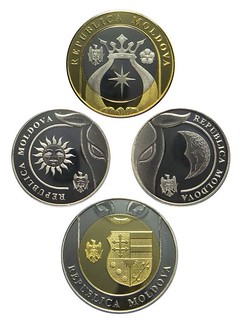
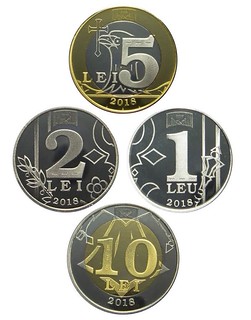
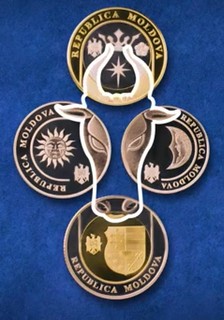
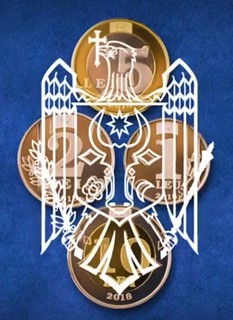
To read the earlier E-Sylum article, see:
THE ROYAL MINT'S COLLECTIVE SHIELD REVERSES
(http://www.coinbooks.org/v21/esylum_v21n32a27.html)
GASVODA PURCHASES CLASSICAL NUMISMATIC GROUP
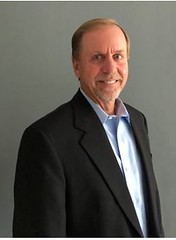 Classical Numismatic Group, Inc. of Lancaster, Pennsylvania and London, England, is pleased to announce that longtime ancient coin collector and hobby leader Michael “Mike” S. Gasvoda has purchased the assets of the company from the current partnership of Victor England and Eric J. McFadden. England and McFadden will continue as Senior Directors for the new company, with Gasvoda taking on a supervisory role as Managing Director of the firm, which will be renamed Classical Numismatic Group, LLC.
Classical Numismatic Group, Inc. of Lancaster, Pennsylvania and London, England, is pleased to announce that longtime ancient coin collector and hobby leader Michael “Mike” S. Gasvoda has purchased the assets of the company from the current partnership of Victor England and Eric J. McFadden. England and McFadden will continue as Senior Directors for the new company, with Gasvoda taking on a supervisory role as Managing Director of the firm, which will be renamed Classical Numismatic Group, LLC.
The official transition will take place on November 1st, 2018, but other than the change of ownership, all other facets of the operation will continue as usual. The firm's entire staff will continue at the company's offices in Lancaster and London. Formed in 1990, CNG is a leading dealer in ancient, medieval, world, and British coinages. The company's coin shop, book offerings, and current auctions are all available on their website at www.cngcoins.com.
Gasvoda, a coin collector since childhood, is well known in the hobby, both for his connoisseurship as a collector, and for his educational outreach. A former Trustee and First Vice President for the American Numismatic Society (ANS) in New York City, Gasvoda has been active with both the ANS and the American Numismatic Association (ANA), as well as the Chicago Coin Club and Tucson Coin Club. He has lectured and exhibited parts of his collection over the years at such venues as the Chicago International Coin Fair, the ANA's World's Fair of Money, and the ANA Summer Seminar. He also wrote numerous articles for The Celator magazine, and is a frequent contributor to The Numismatist.
“I am tremendously pleased that Mike has agreed to take on the responsibility for CNG's future. The most difficult transition for a coin firm is the first change of ownership, from the founders to the next generation, and we think Mike is the perfect person to handle this challenge,” McFadden stated. “He has just the right combination of talents – not only is he a highly successful businessman, but he has a great enthusiasm and an exceptional breadth of numismatic knowledge. Most importantly, Mike shares our commitments to conduct the business according to the highest standards of integrity and scholarship, while providing support for numismatic research and education. And of course he also has some new ideas for the future. I cannot imagine a better successor. Victor and I are now looking forward to working with Mike for many years to come, as together we continue to build relationships with old friends and new.”
Gasvoda, who had owned and operated a business of similar size to CNG, had retired early in life after selling the business to his employees through an Employee Stock Ownership Plan (ESOP). “I wanted to do something else from a business standpoint, and found the ideal opportunity to combine a hobby I love with the business knowledge I have gained from over thirty years managing a similarly sized business,” Gasvoda said.
“I feel the structure of CNG is unique in this field. Their dedication to cataloging, research, and education are unequaled – either here or abroad. I see it as a distinct privilege to be able to work with such an incredibly respected firm. Importantly, both Victor and Eric have agreed to stay involved with the company into the foreseeable future. Their extensive knowledge and experience will continue to be a large part of the CNG operation,” Gasvoda noted.
“This is a unique opportunity for all of us involved. I am stepping in to run the day-to-day operations while we hire and train new staff members. This allows Victor and Eric to do what they do best, and enjoy most – buy and sell coins. We have removed the uncertainty of the future of CNG while growing our strength in the market. We are not only adding staff, but also keeping Victor and Eric involved. This is a wonderful outcome for both the employees and CNG's customer base. The future looks very bright.”
A resident of Indiana, Gasvoda's collecting interests have included Roman Imperatorial and early Imperial (the “Twelve Caesars”), the Greek coinage of Magna Graecia and Sicily, Renaissance medals, and US large cents.
To visit the CNG web site, see:
https://www.cngcoins.com/
HOLABIRD AUGUST 2018 AMERICANA SALE HIGHLIGHTS
HOLABIRD WESTERN AMERICANA COLLECTIONS' 3-DAY AMERICANA AUCTION, AUGUST 24th-26th, WILL FEATURE MORE THAN 2,100 LOTS IN MANY CATEGORIES
The auction will be held online and in Holabird's gallery, at 3555 Airway Dr. (Ste. 308) in Reno.
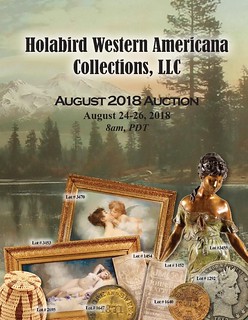 Holabird Western Americana Collections' upcoming Americana auction, planned
for August 24th -26th, marks the start of a summer-fall-winter season brimming with a number of
major collections. The August event will be held online and in Holabird's gallery at 3555 Airway
Drive (Suite 308) in Reno – over 2,100 lots in all – beginning at 8 am Pacific time all three days.
Holabird Western Americana Collections' upcoming Americana auction, planned
for August 24th -26th, marks the start of a summer-fall-winter season brimming with a number of
major collections. The August event will be held online and in Holabird's gallery at 3555 Airway
Drive (Suite 308) in Reno – over 2,100 lots in all – beginning at 8 am Pacific time all three days.
For those unable to attend the sale in person, online bidding will be facilitated by iCollector.com, Invaluable.com, eBay Live and Auctionzip.com. Phone and absentee bids will also be accepted.
Day 1, on Friday, August 24th , will feature 14 lots of gaming collectibles, 13 saloon collectibles, 121 lots of rare vintage and antique bottles, 201 lots of tokens and 387 lots of numismatic items, to include bank bags, coins, books, checks, ingots, medals, mint and proof coin sets, “so-called” dollars, scales, currency, scrip, commemoratives and ephemera – a total of 740 lots for the day.
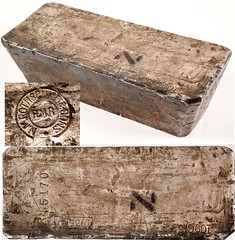 Leading the numismatics category will be possibly the only existing large Rothchild & Sons
silver ingot (966 fine, 1098.3 troy ounces), with the Rothchild & Son hallmark and 1935 date
stamp (est. $25,000-$35,000); and a spectacular commemorative medallion collection from the
Cripple Creek and Victor Gold Mining Company (Colorado), comprising ten one-half ounce
solid gold medallions from various years and a large gold-silver medallion (est. $7,000-$10,000).
Leading the numismatics category will be possibly the only existing large Rothchild & Sons
silver ingot (966 fine, 1098.3 troy ounces), with the Rothchild & Son hallmark and 1935 date
stamp (est. $25,000-$35,000); and a spectacular commemorative medallion collection from the
Cripple Creek and Victor Gold Mining Company (Colorado), comprising ten one-half ounce
solid gold medallions from various years and a large gold-silver medallion (est. $7,000-$10,000).
Also expected to generate keen bidder interest is a proof one-ounce gold 1994 Chinese Unicorn Yuan coin, one of fewer than 1,000 minted, in the original velvet-lined box, with an engraved unicorn on the cover and a certificate of authenticity (est. $5,000-$6,150). A star lot of the tokens category promises to be a hoard of nearly 60 copper-appearing metal tokens, all from the Nevada Club in Reno and the Nevada Lodge in Lake Tahoe, from the Gillio Hoard (est. $1,000-$1,500).
An original oil painting on canvas advertising Moon Castle Whiskey (saying “Now served here at Tombstone's own Birdcage Theater”), beautifully housed in a 22 ½ inch by 27 inch frame, a fantasy piece meant to attract patrons to Western saloons, should reach $1,500-$2,500. Also, a Union Soda Works (Tombstone, Ariz.) medium aqua bottle, clean and sparkling, with an applied top, some whittle, no pontil and a little lip damage in the back, has an estimate of $700-$1,500.
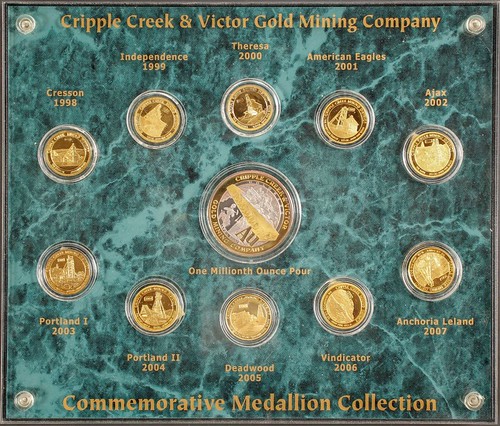
Commemorative medallion collection from the Cripple Creek and Victor Gold Mining Co.
Day 2, on Saturday, August 25th , will contain 112 lots of cowboy collectibles, 64 lots of firearms and weaponry, 63 lots of militaria, 19 general foreign lots and more than 450 lots of general Americana, to include advertising items, bonds, books, entertainment industry, Gold Rush, lamps, glassware and flatware, jewelry and watches, sheet music, tools and vintage apparel.
Two very different lots that day carry identical estimates of $5,000-$10,000. One is the actual Winchester model 1892 44-40 rifle that belonged to Capt. Guillermo “Flores” Reyes, a member of Poncho Villa's legendary Revolutionary Army, with solid provenance. The other is a lovely Daum Nancy Art Nouveau classic cased vase, 11 inches tall, with a carved black Oriental poppy exterior design and a nice violet and magenta base. The circa 1900 vase is marked Daum Nancy.
Who's more famous, Marilyn Monroe or Harry Houdini? Answer: both. A stock certificate for the Houdini Picture Corporation, Inc., issued for five shares to Carrie S. Rich in 1921 and signed by Houdini himself as president of the company, should fetch $2,000-$3,000; while an original page from Marilyn Monroe's personal script for the 1956 movie Bus Stop, a limited edition, #47 of 124, accompanied by a black and white photo of Monroe, framed, should hit $1,000-$2,000.
Day 3, on Sunday, August 26th , will be packed with 260 lots of mining collectibles, 19 mineral specimen lots, 46 lots of railroadiana, 15 lots of Wells Fargo & Express, 11 lots of postal history, 15 lots of political memorabilia, 10 lots of World's Fair and Expositions, 12 lots of artwork, 67 lots of Native Americana and 127 lots of what Holabird is calling bargains and dealer specials.
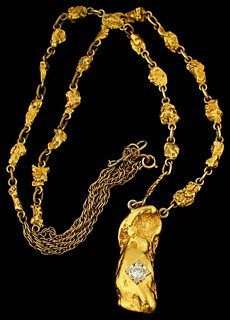 An impressive gold and diamond necklace boasting 24 small gold nuggets (1.11 ozt) and one
large gold nugget (1.91 ozt), set with a .5 carat round cut diamond on a 22-inch gold chain with a
double clasp, has a pre-sale estimate of $6,500-$8,500. Also, a mid-19 th century gold in quartz
aesthetic native gold specimen from northern Sierra Nevada in Nevada County, California,
featuring a leaf gold in quartz matrix with associated pyrite crystals, should bring $3,600-$5,400.
An impressive gold and diamond necklace boasting 24 small gold nuggets (1.11 ozt) and one
large gold nugget (1.91 ozt), set with a .5 carat round cut diamond on a 22-inch gold chain with a
double clasp, has a pre-sale estimate of $6,500-$8,500. Also, a mid-19 th century gold in quartz
aesthetic native gold specimen from northern Sierra Nevada in Nevada County, California,
featuring a leaf gold in quartz matrix with associated pyrite crystals, should bring $3,600-$5,400.
Two original paintings by the famed California artist Andrew Putnam Hill (1853-1922) will come up for bid. One is a pastel colors on board work titled Cupid and Woman, an allegorical use of Cupid showing a protectionary kiss, housed in a 16 ½ inch by 26 inch gold leaf frame (est. $7,500-$12,500). The other is a gouache depiction of a reclining nude, also housed in a gold leaf frame measuring 17 inches by 29 inches (est. $5,000-$7,500). Both paintings appear unsigned.
A colorful painting showing a wide array of characters in a saloon setting by Utah artist Arnold Friberg (1913-2010) has an estimate of $1,000-$2,000. In 1977, Friberg was commissioned by the Gold Nugget Casino in Las Vegas to make a series of saloon-related paintings. This one is signed and numbered (795/1500). Also, a weekly register overland mail document for the Pony Express, dated 1861 (from St. Joseph, Mo., to Placerville, Calif.) should reach $1,500-$3,000.
The collections that will be spread out over the course of several seasons and multiple auctions at Holabird are many and varied. They include the Medallic Arts/Northwest Territorial Mint Reference Ingot Collection, the James Mackie Art & Western Americana Collection, the R.B. Worthington Texas Token Collection and the Ken Prag American Stock Certificate Collection.
“The Prag collection of American stock certificates is inarguably the highlight of the fall and winter sales,” said Fred Holabird of Holabird Western Americana Collections, adding, “One of every stock he ever handled is in the collection, untouched and unpicked. As usual, we're also offering a wide variety of his duplicate material in the dealer/bargain section of the catalogs.”
Additional collections will include the Falcone Medal Collection (now thru October), more of the Hawaii Numismatic Collection, the Daniel Manassillian collection of tokens and Americana, cowboy collectibles from three collections (spurs, saddles, saddle bags, etc), antique bottles from the Rod Stock and other collections, and the Jim Clark collection of entertainment collectibles.
Color catalogs are available by calling 1-844-492-2766, or 775-851-1859. Also, anyone owning a collection that might fit into an upcoming Holabird Western Americana Collections auction is encouraged to get in touch. The firm travels extensively throughout the U.S., to see and pick up collections. Last year it visited Boston, Florida, Seattle and New York, among other destinations.
For more information, see:
http://holabirdamericana.com/
NUMISMATIC NUGGETS: AUGUST 19, 2018
Here's a selection of interesting or unusual items I came across in the marketplace this week. Tell us what you think of some of these. -Editor
1893 Mint Exhibit Medal
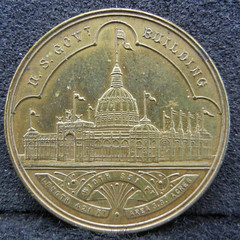
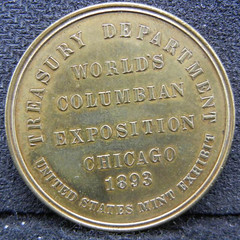
A decent example of the medal struck as a souvenir of the U.S. Mint exhibit at the 1893 Columbian Exposition. See the earlier E-Sylum articls for more information. -Editor
To read the complete lot description, see:
Lot 6B: 1893 Chicago Columbian Exposition Bronze Token
(https://www.invaluable.com/auction-lot/-1-c-4264F3C819)
To read the earlier E-Sylum articles, see:
QUERY: COLUMBIAN EXPOSITION TREASURY DEPARTMENT EXHIBITS INFO SOUGHT
(http://www.coinbooks.org/esylum_v16n14a15.html)
THE TREASURY DEPARTMENT'S 1893 COLUMBIAN EXPOSITION EXHIBITS
(http://www.coinbooks.org/esylum_v16n15a13.html)
Uniface Bronze Specimen Cent
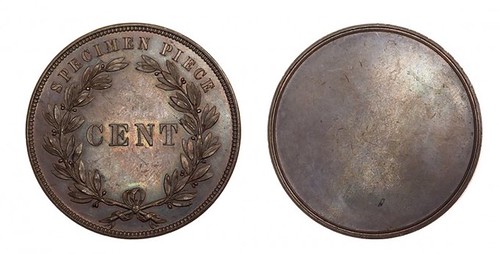
China (?), uniface bronze specimen Cent, ND (c. 1895), Heatons, CENT in large letters within wreath, SPECIMEN PIECE over. Rev. Blank; raised rim, 38mm, 31.27g (O. Sweeney Adv. 22).
Extremely fine, rare.
Ex Baldwin's Auction 46, 2 April 2009, lot 299 (realised US$480).
Ex Glendining's 1992: believed to be a test piece for die-making machinery designed for Hangchow.
A curious item from the BAldwin's site. Do similar pieces exist? Does anyone know more about them? -Editor
To read the complete lot description, see:
China (?), Uniface Bronze Specimen Cent, ND
(https://www.baldwin.co.uk/china-uniface-bronze-specimen-cent-nd-z66576.html)
1923 Westphalia Notgeld Token 10000 Marks
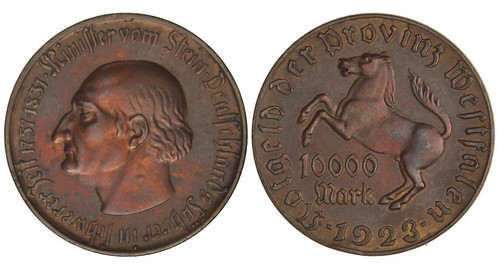
ALEMANIA. Token 10.000 Marcos. 1923. WESTFALIA. 33,32 grs. Br. Von Stein. Token de Inflación. EBC+.
To read the complete lot description, see:
ALEMANIA. Token 10.000 Marcos. 1923. WESTFALIA
(https://www.soleryllach.com/soler4/fichaLote/1104-1/1984)
WAYNE'S NUMISMATIC DIARY: AUGUST 19, 2018: PART 1
Wednesday, August 15, 2018
As planned I spent a few days at the American Numismatic Association's World's Fair of Money this week in Philadelphia. I pointed my car northward about 7am and after a couple short stops arrived about 10:30am. After navigating to a spot in a nearby parking garage I checked into my room at the Philadelphia Marriott Downtown.
I joked with the clerk after he booked me into room 1776, a primo number for the birthplace of the Declaration of Independence. We talked about it being the "Presidential Suite", but later I thought "His Excellency's Suite" would be more appropriate. It was a nice, comfy room.
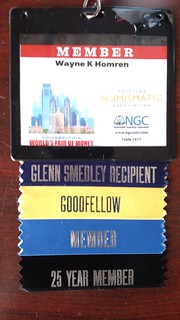 I saw a text on my phone from Numismatourist Howard Berlin who'd come in from Wilmington, DE. I told him I could meet him at the Numismatic Bibliomania Society table once I got through registration. I was actually preregistered, but I wanted to pick up some ribbons missing from my convention packet. The ANA's Cary Hardy swiftly found Glenn Smedley Recipient and Goodfellow ribbons.
I saw a text on my phone from Numismatourist Howard Berlin who'd come in from Wilmington, DE. I told him I could meet him at the Numismatic Bibliomania Society table once I got through registration. I was actually preregistered, but I wanted to pick up some ribbons missing from my convention packet. The ANA's Cary Hardy swiftly found Glenn Smedley Recipient and Goodfellow ribbons.
Once I got onto the bourse floor I ended up passing up the NBS table which wasn't directly in the labelled aisle 1400. But I did get to briefly speak with Shanna Schmidt and her mom Ellen, then with Emma Pratt and Mary Lannin at the American Numismatic Society table.
NBS Table
I reached the NBS table and apologized to Howard for being late. We had a nice conversation, then I greeted Joel Orosz and Len Augsburger who were manning the table for the day. Here are some photos from various visits to the table during the show.
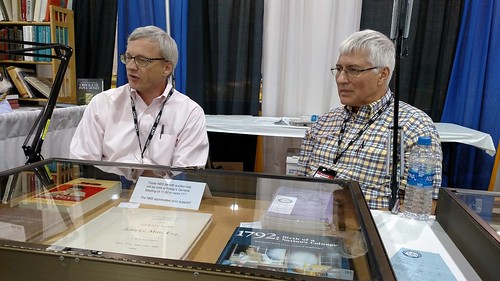
Augsburger and Orosz
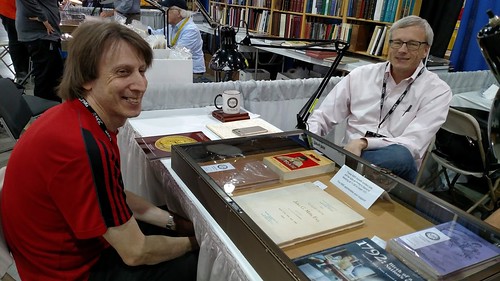
Saul Teichman and Len Augsburger
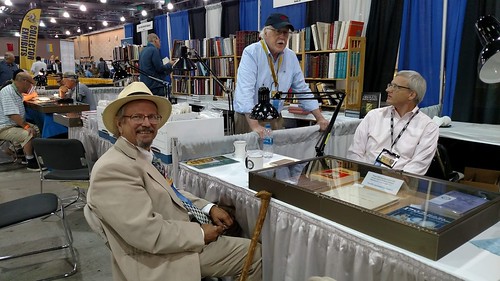
Bob Evans and Len Augsburger with Charlie Davis next door
Sundman Series Luncheon
My next stop was the Sundman Luncheon. On the way out of the bourse I spoke briefly with Rob Rodriguez. After getting quite lost trying to find the room I hooked up for a bit with the equally lost Paul Gilkes of Coin World. After arriving at last (and late) I found a spot at a table with Fred Schwan and his wife, Brett Irick, and ANA Executive Director Kim Kiick. Later David Sundman stopped to visit. It was an enjoyable lunch. Conversation topics including the Newman Numismatic Portal and the ANA Edition of The E-Sylum.
I was really dragging by mid-afternoon and nearly missed seeing Pat McBride of PAN as we passed on the escalators after the luncheon.
A March Around the Bourse
I returned to the bourse floor to visit friends, E-Sylum supporters, and look for material for the Newman Numismatic Portal. Here are some photos.
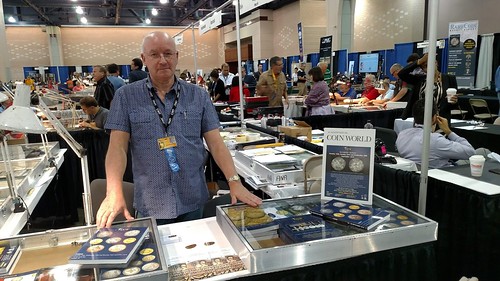
Peter Preston-Morley of Dix Noonan Webb
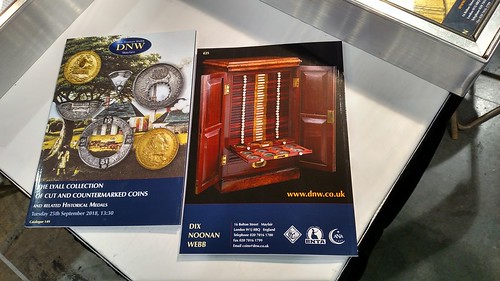
DWN catalogue of the Bob Lyall Cut and Countermarked Collection
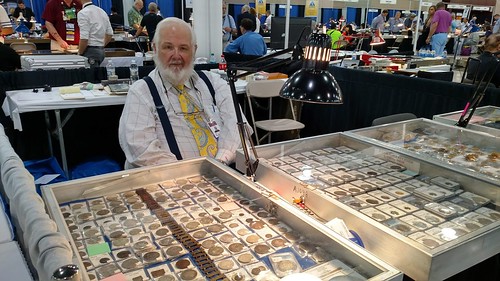
Jeff Zarit
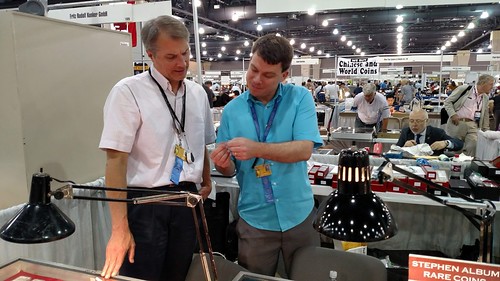
Joe Lang and Mike Barry of Stephen Album Rare Coins
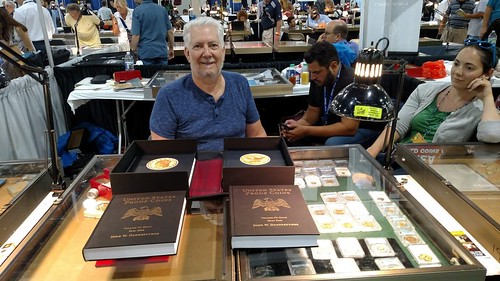
John Dannreuther and his new book on proof gold
To read the earlier E-Sylum article, see: NEW BOOK: U.S. PROOF GOLD COINS VOL IV: GOLD (http://www.coinbooks.org/v21/esylum_v21n07a02.html)
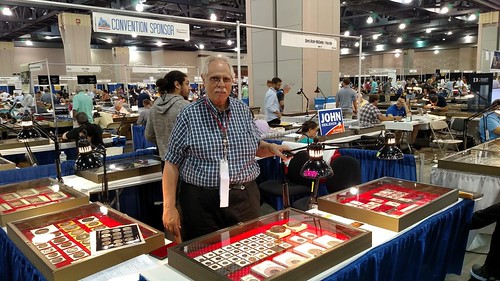
Tony Terranova
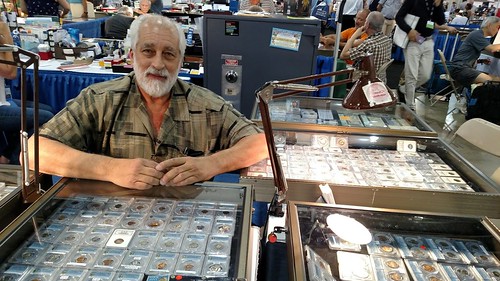
Fred Weinberg
A Mint Encounter
I briefly ran into Mary Burleson chatting with Ken Bressett then followed the two of them over to the U.S. Mint booth to meet the new U.S. Mint Director David Ryder. He was very personable and gladly stood for several photos. Former Mint Director Ed Moy came by and it was hold home week for him and the mint staff. Here are some photos.
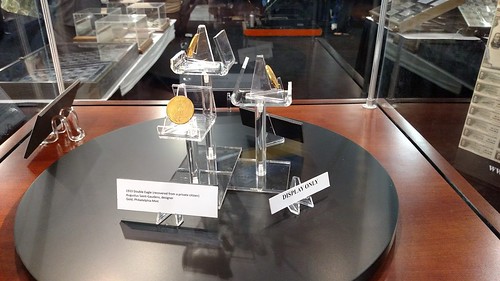
1933 Double Eagle Exhibit
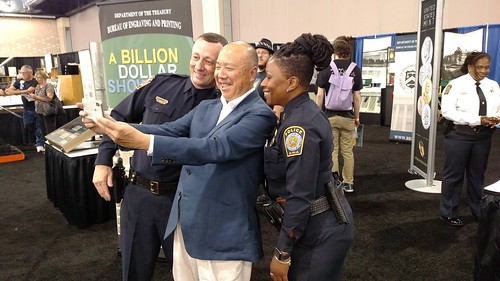
Ed Moy taking photo with Mint Police
Director Ryder next went to the Pennsylvania Association of Numismatists booth for some more photo ops.
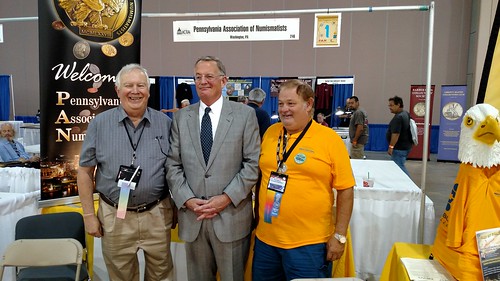
Richard Jewell, David Ryder and Ed Hammond
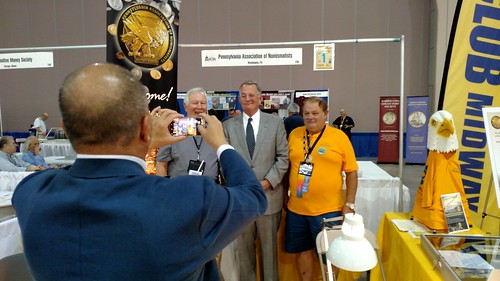
Ed Moy got a shot, too.
That evening a number of bibliophiles attended the Attinelli Society dinner at the City Tavern Restaurant, a 1976-built replica of a colonial era tavern. I greatly enjoyed my conversations with NBS President Tom Harrison and his wife Pam, Dave Perkins, Joel Orosz, Neil Musante, and others. It was a great colonial-style meal, but I was glad to get back to my hotel and call it a night.
WAYNE'S NUMISMATIC DIARY: AUGUST 19, 2018: PART 2
Thursday, August 16, 2018
The Jefferson Walk
Thursday morning I hit the lobby early and grabbed a pastry from Starbuck's for breakfast. I chatted with Clifford Mishler and John Feigenbaum before meeting up with Joel Orosz. He was going lead Kellen Hoard, his mom and me on a recreation of Thomas Jefferson's walk on July 11, 1792 when he delivered silver to the U.S. Mint to be made into our first Federal coinage, the 1792 Half Dismes. It was an enjoyable morning.
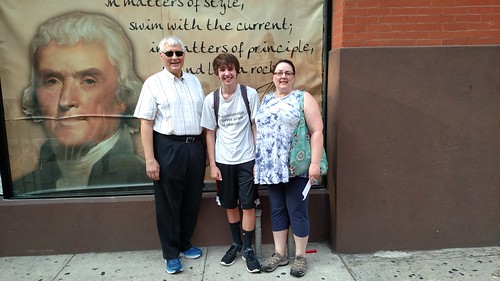
Tom, Joel, Kellen and Cathy
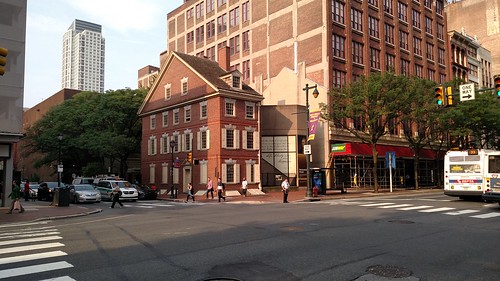
Reconstructed house where Jefferson wrote the Declaration of Independence
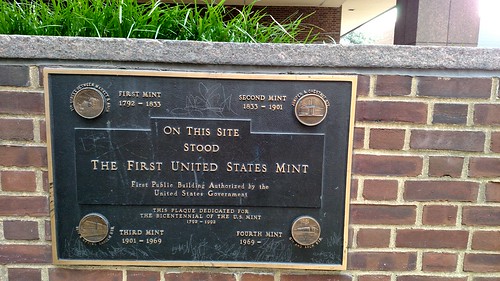
Afterwards we stopped in the Reading market for snacks. Here we fed Philbert, a pig sculpture collecting donations to feed the needy. Then I fed myself a nice Gumbo from Beck's Cajun foodstand.
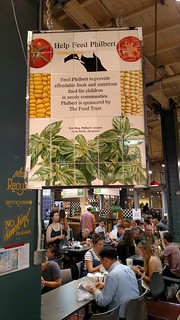
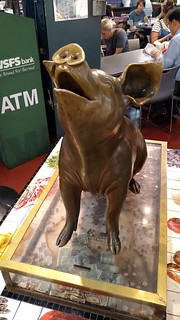
Feed Philbert
My next stop was the Numismatic Literary Guild symposium with Charles Morgan of Coinweek, CDN Editor Josh McMorrow-Hernandez and Scott Travers. It was an interesting discussion of popular ploys and pitfalls in reaching out to the non-collecting public. Afterwards I chatted a bit with Pete Smith, Bob Leonard and Maggie Judkins of COINage magazine.
Next I participated in the NBS board meeting, where we covered a number of issues including finances, membership, our Constitution and nonprofit status, The E-Sylum and more.
NBS Symposium
Immediately after the board meeting was the NBS Symposium featuring speaker Roger Burdette. He gave an excellent talk on doing numismatic research, and his presentation is already available on the NBS web site.
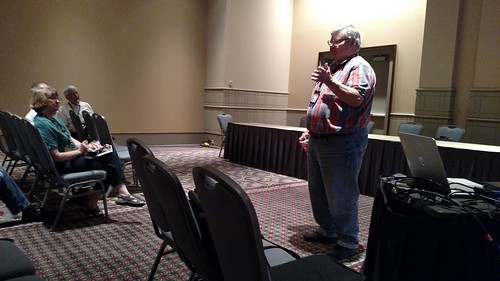
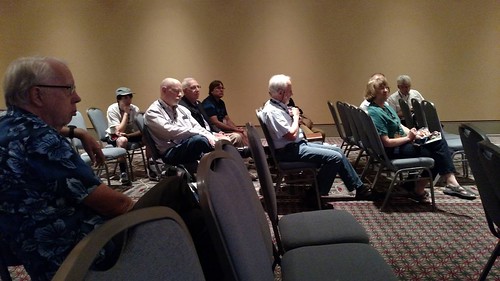
To read Roger's full presentation, see:
Concepts of Numismatic Research
(http://www.coinbooks.org/resources/numismatic_research.pdf)
After the symposium I marched back to Becks for corn chowder and another helping of Gumbo to tide me over until dinner. I visited some more bourse tables and returned to my room for a bit before the NLG Bash.
NLG Bash
The Bash venue was difficult to find, but I managed to get there. I paid Maurice Rosen for my ticket and spoke a bit with Mark Ferguson and John and Nancy Wilson.
I found an empty seat at a table with Paul Gilkes, Pete Smith, David Schwager, Kellen Hoard, Allan Schein and others.
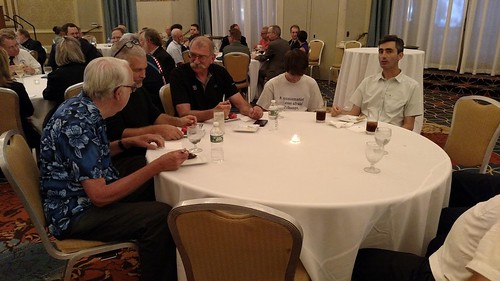
Pete Smith, Dan Hansen, Allan Schein, Kellen Hoard, David Schwager
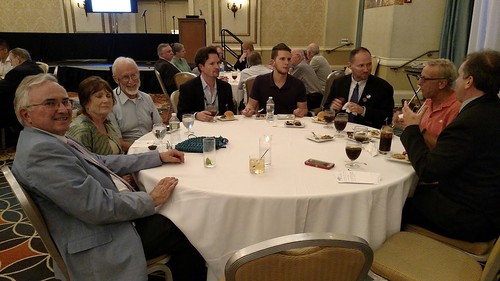
David Sundman, Susan Trask, David Gladfelter, Steve Roach, Caleb Noel, Dennis Tucker, Frank J. Colletti and ???
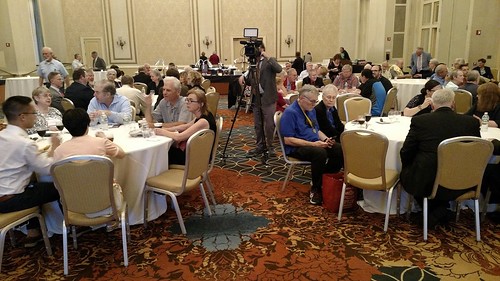
David Lisot filming
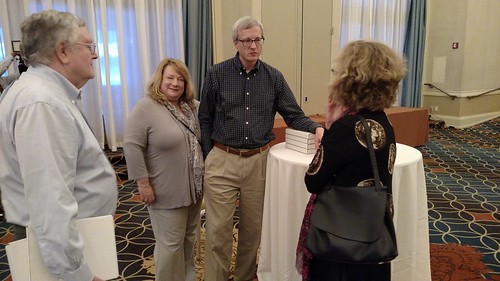
Bob Leonard, Deb Kurtz, Len Augsburger, Ute Wartenberg Kagan
More next week on the NLG award winners.
WAYNE'S NUMISMATIC DIARY: AUGUST 19, 2018: PART 3
Friday, August 17, 2018
Friday morning I reported for duty as Money Talks speaker introducer. The 9 o'clock talk was on foreign coins struck at U.S. Mints by sixteen-year-old Kenny Sammut. I arrived about 8:30 and Kenny was there with his father Ken assisting with video production. While waiting for the appointed time I met Sam Gelberd of the ANA Education department and Abigail Zechman of Florida, recently named the ANA's Young Numismatist of the Year. Here are some photos from my morning shift.
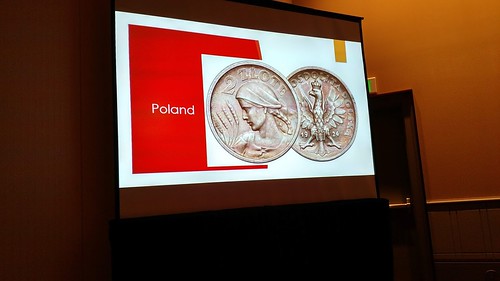
Kenny's Sammut's talk
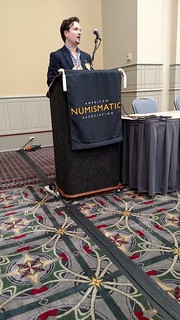
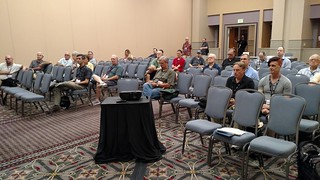
Steve Roach and audience
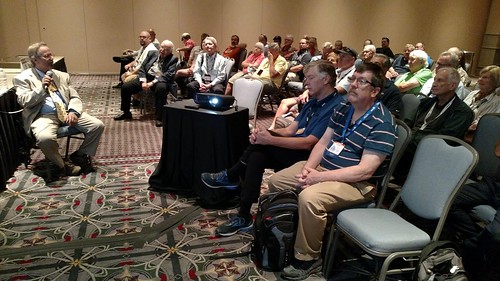
Bob Evans and audience
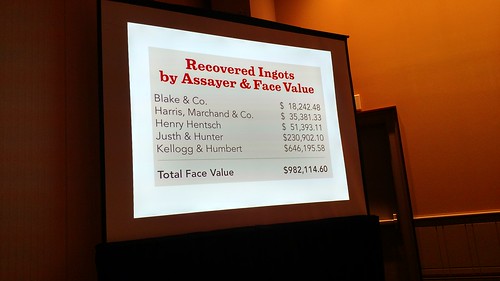
Bob Evans slide
NBS General Meeting
I had to miss half of Bob Evans' talk so I could go to the NBS General Meeting. It was very well attended and because of bidder schedules it was decided to hold the fundraising auction first. Bidding was quite active. Look for results in the next Asylum. Here are some photos.
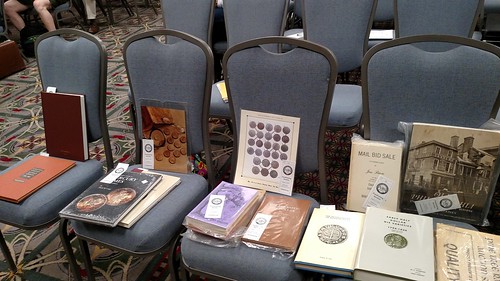
Some Auction lots
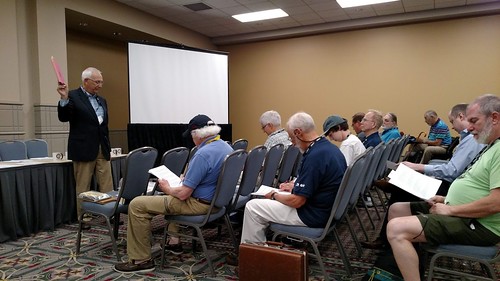
Dan Hamelberg displaying a lot
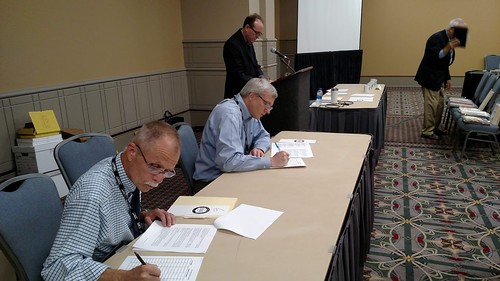
Tom Harrison and Len Augsburger recording bids; David Fanning at podium calling sale
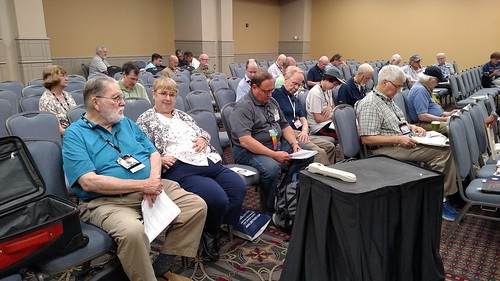
Crowd shot
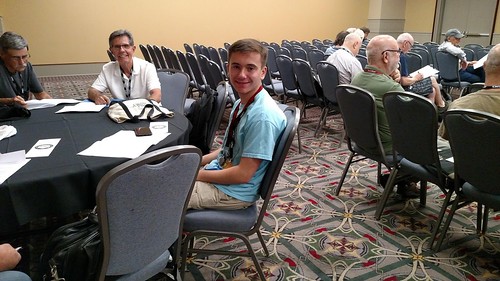
Overflow table, including Chuck Heck and Garrett Ziss
After the sale we began the meeting proper. See the next Asylum for all the details and more photos. The clock was ticking and I had to run to the Money Talks room to introduce Len Augsburger for his talk on the Newman Portal. But before leaving I gave out NBS Appreciation Awards to John Nebel and Bruce Perdue for their tireless efforts supporting The E-Sylum and the NBS web site.
I had to miss David Fanning's talk on the state of the numismatic literature market, but I'll look forward to a report in the next Asylum.
Newman Numismatic Portal Money Talks
I made it to the Money Talks room with a few minutes to spare. I introduced Len by noting how proud and privledged I feel to have been with the Newman Numismatic Portal project from the beginning with a meeting in St. Louis with Eric, Evelyn and Andy Newman and others.
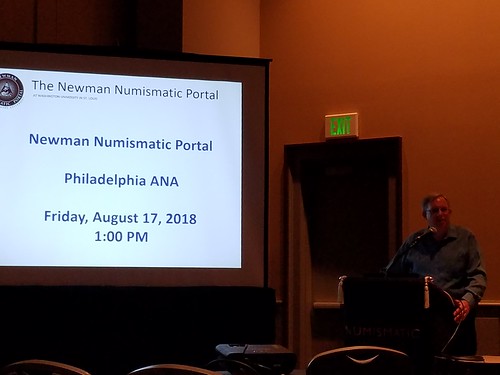
Wayne at podium (Image courtesy Deborah Kurtz)
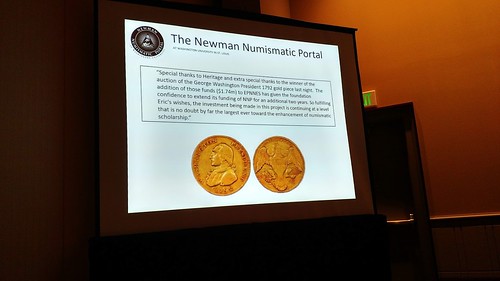
Latest Eric P. Newman Collection Sale
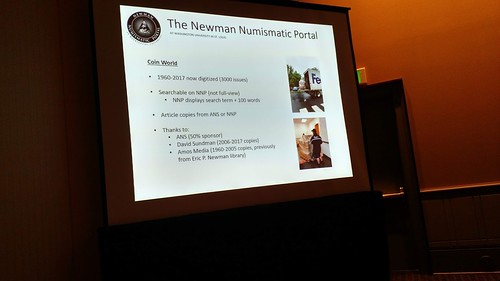
Latest Newman Numismatic Portal Acquisition
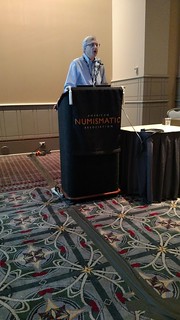
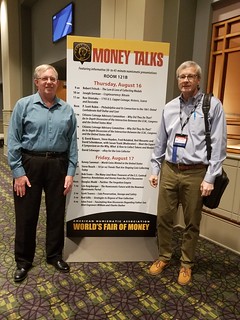
Left: Len at podium
Right: Wayne and Len afterwards (Image courtesy Deborah Kurtz)
The PAN Eagle
Later I stopped back at the bourse area visiting dealers and other friends. I walked through the exhibit area but I'll save those photos for another report.
One of the tables I visited was the PAN table where I spoke with my old friend Pat McBride and met his friend Peter the Eagle (photos courtesy Pat McBride).
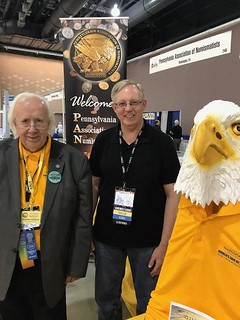
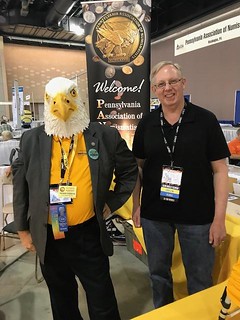
Dinner With Kellen
The evening was a very pleasant one spent having dinner at the Bistrot La Minette with young numismatist Kellen Hoard and his mom, Joel Orosz and Len Augsburger and his wife Deborah Kurtz. Conversation topics were all over the map, including the Carnegie Library book thefts, the NBS fundraising auction, our Jefferson Walk, Walter Breen, the ANA's Numismatics correspondence course, numismatic ephemera, visiting numismatic libraries, and the general markets for rare coins and numismatic literature.
WAYNE'S NUMISMATIC DIARY: AUGUST 19, 2018: PART 4
Saturday, August 18, 2018
Rittenhouse Society breakfast
I spotted John W. Adams and Jeff Garrett in the hotel lobby Saturday morning and would see them later at the Rittenhouse Society breakfast over at the Hilton. I waited to walk over there together with Numismatic Bookie Joel Orosz, Len Augsburger and his wife Deb.
The breakfast was a nice affair as always. Founding member Ken Bressett was there with his son Phil, although our other founding member Dave Bowers had to depart the convention early due to travel schedules and was already on his way home to New Hampshire.
After breakfast attendees take turns standing to mention their latest research projects. Numismatic research and writing is alive and well with a number of new books, publication and exhibits in the works. Look for future announcements here in The E-Sylum.
I discussed my work with the Newman Numismatic Portal and an article I'm working on with reader Chip Howell about the coins of ISIS - this grew out of earlier E-Sylum articles on the topic.
At my table were Len Augsburger and Joel, Neil Shafer, Pete Smith, Neil Musante, John W. Adams, and Syd Martin. It was great speaking with everyone.
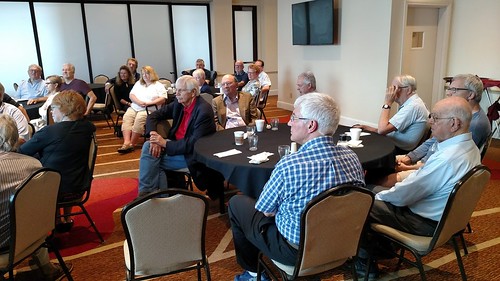
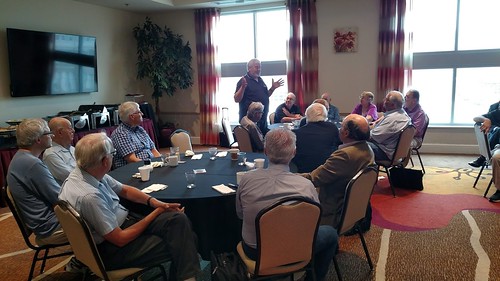
Ray Williams speaking
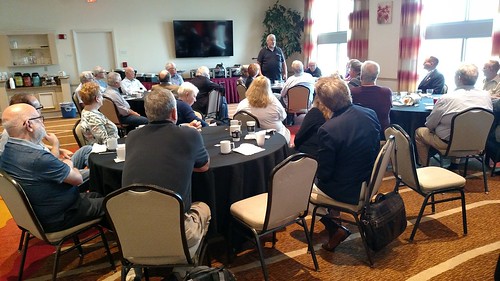
Crowd shot with Ray Williams speaking
Before heading back to the hotel I chatted with Bob Van Ryzin, Robert Hoge, and Neil Shafer. On the walk back I spoke with Barbara Gregory about submitting our ISIS article to The Numismatist once it's complete.
I took about an hour to work on some email and pack my bags before hitting the road home to Virginia. It was an uneventful trip, and had sure been a memorable convention. What's better than enjoying a hobby surrounded with friends old and new?
Stuff You don't Often See
To round out this Diary, here are a few odd things I've never seen at a coin show before.
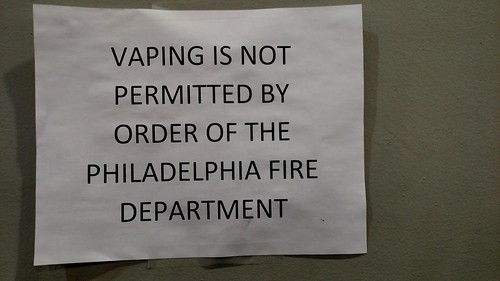
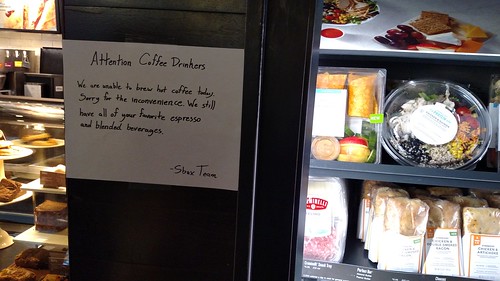
Starbucks. Was. Out. Of. Coffee.
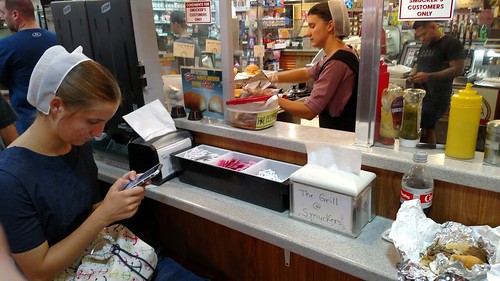
So, what do Amish emoji look like, anyway?
Here are links to some other numimatic blogs from the show.
Joshua McMorrow-Hernandez:
Night At The Museum: ANA World's Fair Of Money Kickoff Celebration in Philadelphia
(http://blog.greysheet.com/night-at-the-museum-ana-worlds-fair-of-money-kickoff-celebration-in-philadelphia/)
Dennis Tucker:
The Dentuck ANA blog: Wednesday, August 15, 2018
(http://mintnewsblog.com/the-dentuck-ana-blog-wednesday-august-15-2018/)
Kenny Sammut and the John Reich Collectors Society:
Early US Silver Coins and the John Reich Collectors Society - Numismatics with Kenny
(https://www.youtube.com/watch?v=IiSn4jPNuJs)
YOUNG COLLECTOR ACTIVITIES IN AUSTRALIA
The American Numismatic Association wasn't the only group having a show this week. The Australian Numismatic Dealers Association held the Melbourne ANDA Money Expo this Saturday-Sunday August 18-19th. What caught my eye in the Australian Coin Collecting Blog were these photos of activities for young collectors - the 2 Cent Challenge and the 5 Cent Forage. -Editor
Just for the kids 2 Cent Challenge also appealed to the older folk -who are we to judge! Collecting is enjoyed by all ages not just the 5-15. It's great to see parents helping the kids out too.
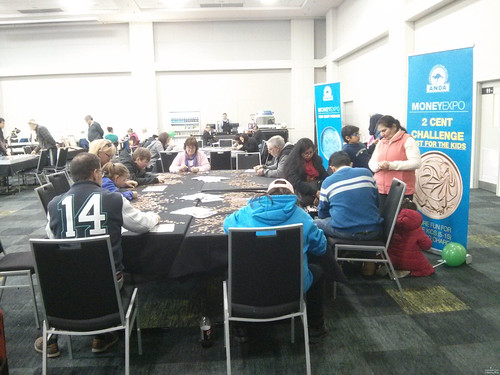
The 5 Cent Forage also a fun project for a sunny and stormy (even hail battered the roof at one stage) cold and wet wintery Melbourne day.
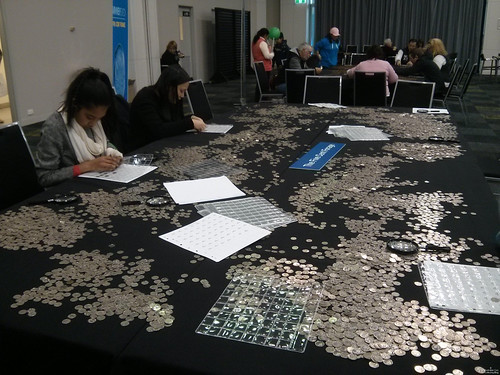
To read the complete article, see:
Melbourne ANDA Money Expo August 18-19th 2018
(https://www.australian-coins.com/coin-news/melbourne-anda-money-expo-august-18-19th-2018/)
IN OTHER NEWS: AUGUST 19, 2018
Here are some additional items I came across in the media this week that may be of interest, starting with some ANA auction sale reports. -Editor
1792 Washington Gold Piece Brings $1.74 Million
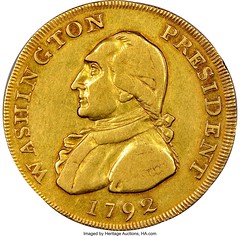
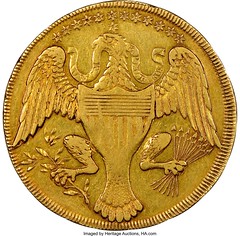
A one-of-a-kind 1792 gold coin believed by its previous owner to have once been a cherished memento of U.S. President George Washington sold for $1,740,000 Thursday, Aug. 16, in Philadelphia by Heritage Auctions. This is the first time the 1792 $10 Washington President gold eagle pattern coin appeared at public auction since 1890; 100 percent of the net proceeds will benefit charitable causes.
Despite his vast collection, Newman considered the 1792 Washington gold eagle his favorite coin of all for a special reason. Newman believed the Washington gold eagle was not produced because legend stated it defied the president's own edict that his likeness not appear on any U.S. currency to avoid appearing as a monarch to the new democracy.
To read the complete article, see:
The 1792 Gold Piece that Might Have Once Jingled in George Washington's Pocket Sold for $1.74 Million in Philadelphia
(http://blog.greysheet.com/the-1792-gold-piece-that-might-have-once-jingled-in-george-washingtons-pocket-sold-for-1-74-million-in-philadelphia/)
1854-S Half Eagle Brings $2.16 Million
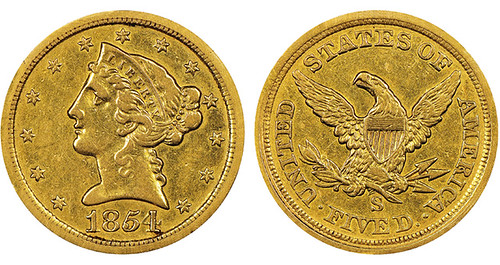
The recently discovered fourth identified example of 1854-S Coronet, No Motto gold $5 half eagle realized $2.16 million Aug. 16 in Philadelphia during Heritage Auctions' Platinum Night session held in conjunction with the American Numismatic Association World's Fair of Money.
Numismatic Guaranty Corp. authenticated the find as genuine and graded and encapsulated it Extremely Fine 45.
To read the complete article, see:
Recently discovered 1854-S half eagle brings $2.16 million
(https://www.coinworld.com/news/us-coins/2018/08/Recent-discovery-1854-s-half-eagle-tops-2-million-dollars.html)
Eliasberg 1913 Liberty Nickel Brings $4.56 Million
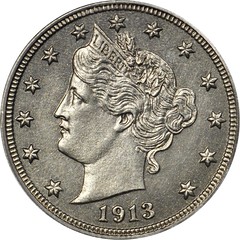
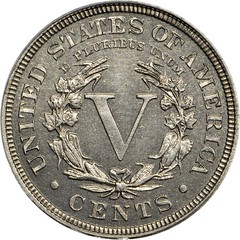
The sale of the finest-known example of the 1913 Liberty Head 5-cent coin proved anti-climactic Aug. 15 when it sold at its opening bid of $3.8 million. When the buyer's fee was added, the former Eliasberg Collection coin realized $4.56 million.
The Stack's Bowers Galleries auction room at the American Numismatic Association World's Fair of Money was packed and a local television camera was in place when the coin was opened at $3.8 million. Auctioneer Melissa Karstedt called for bids and when none were proffered, offered a cut bid that would have put the bid at $3.9 million rather than at $4 million (bids at the level are accepted in $200,000 increments). When no one stepped up at the cut bid, the coin was hammered at the opening bid.
To read the complete article, see:
Eliasberg specimen of 1913 5-cent coin brings $4.56 million
(https://www.coinworld.com/news/us-coins/2018/08/eliasberg-1913-5-cent-brings-4-and-a-half-million-dollars.html)
For more information on the coin, see the lot listing:
1913 Liberty Head Nickel. Proof-66 (PCGS). CAC.
(https://auctions.stacksbowers.com/lots/view/3-BINKT)
How the Portable Antiquities Scheme Records Coins
Here's a nice article and video about how the Portable Antiquities Scheme records and processes finds of coins and other ancient artifacts in England and Wales. -Editor
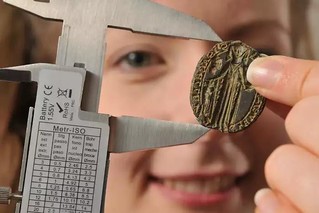 Is it treasure trove? How Lancashire's special finds - from the Silverdale hoard to rare coins and jewellery - are recorded through the Portable Antiquities Scheme.
Is it treasure trove? How Lancashire's special finds - from the Silverdale hoard to rare coins and jewellery - are recorded through the Portable Antiquities Scheme.
To read the complete article, see:
(https://www.lep.co.uk/news/is-it-treasure-trove-how-lancashire-s-special-finds-from-the-silverdale-hoard-to-rare-coins-and-jewellery-are-recorded-through-the-portable-antiquities-scheme-1-9302453)
Coin Collectors of the Ganges
Dick Hanscom and Arthur Shippee forwarded this video from BBC News. Thanks! -Editor
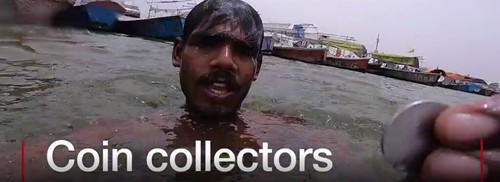
A group of men in the northern Indian town of Allahabad spend 10-12 hours in the Ganges river every day fishing for coins.
This is their only source of income.
To watch the video, see:
Fishing for coins in the Ganges river to survive
(https://www.bbc.com/news/av/world-asia-india-45130247/fishing-for-coins-in-the-ganges-river-to-survive)
China Boosts Printing of Foreign Banknotes
Howard Berlin forwarded this one from the South China Morning Post. -Editor
China is printing foreign currencies on a massive scale as Beijing seeks to increase its influence on the world economy and geopolitics.
To read the complete article, see:
Why other countries are giving China a licence to print money
(https://www.scmp.com/news/china/society/article/2158782/why-other-countries-are-giving-china-licence-print-money)
RCM Gold Smuggler's Fine Reduced
Dick Hanscom also forwarded this update from the Daily Mail on the Royal Canadian mint employee who smuggled out gold hidden in an awkward place. -Editor
A former Royal Canadian Mint employee who stole 22 cookie-sized pieces of refined gold by hiding them in his rectum has his $145,900 fine lessened in court.
Leston Lawrence, 35, was sentenced to 30 months in prison last year after stealing the pieces from the mint and selling 17 of them through Ottawa Gold Buyers.
At the time of his sentencing, Ontario Court judge Peter Doody ordered Lawrence to pay a fine of US $145,900 (CA $190,000), a fine that has been reduced.
Earlier this month, three judges ruled that Lawrence's fine should be reduced by nearly $60,000 because the gold he stole was not as valuable when he stole and sold it as it was when he was ordered to pay it back.
And yes, that's the judge's real name. The Daily Mail based its article on t[reporting by the Ottawa Citizen. -Editor
To read the complete article, see:
Canadian mint employee, 35, who smuggled 22 gold pucks in his rectum has $145,900 fine reduced in court
(http://www.dailymail.co.uk/news/article-6068823/Canadian-mint-employee-35-smuggled-22-gold-pucks-rectum-fine-reduced.html)
1921 ANA CONVENTION LADIES PHOTO
Someone on the Collector's Universe forums uncovered this great 1921 Boston ANA Convention photo and posted it with the heading "Proof that Coin Collectors can be Chick Magnets..." -Editor
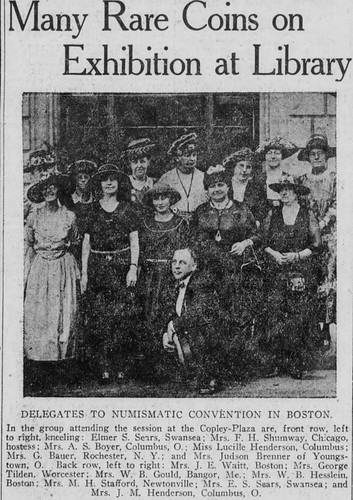
To read the complete post, see:
Proof that Coin Collectors can be Chick Magnets...
(https://forums.collectors.com/discussion/1003966/proof-that-coin-collectors-can-be-chick-magnets)
SOME OF THE WORLD'S MOST BEAUTIFUL LIBRARIES
As promised, here's some more eye candy for the bibliophile - images from the new book by Massimo Listri on The World's Most Beautiful Libraries. -Editor
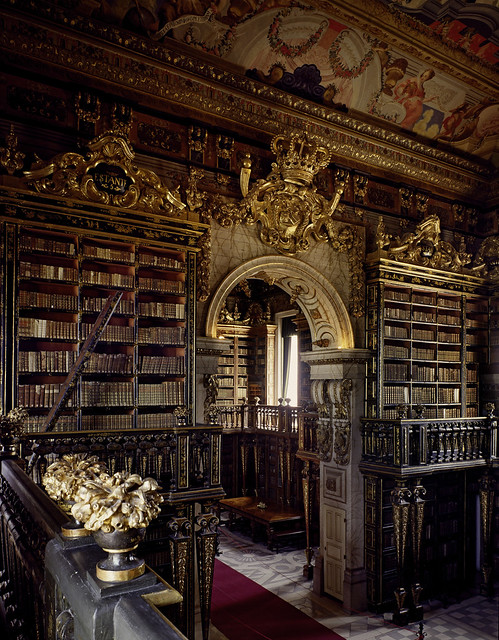
Biblioteca Joanina, Coimbria, Portugal
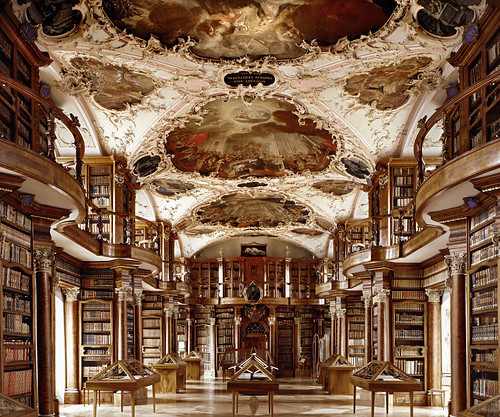
Stiftsbibliothek Sankt Gallen, St. Gallen, Switzerland
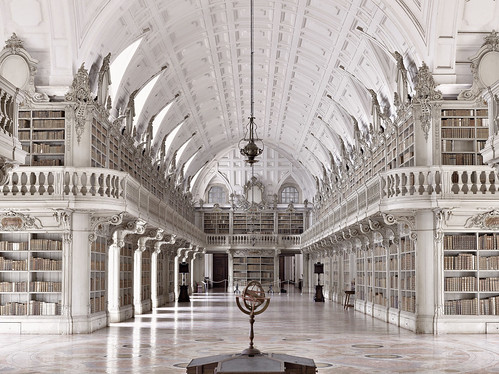
Biblioteca do Convento de Mafra, Mafra, Portugal
To read the complete article, see:
Look Inside the World's Most Beautiful Libraries in a New 560-Page Photo Book by Massimo Listri
(https://www.thisiscolossal.com/2018/08/the-worlds-most-beautiful-libraries/)
FEATURED WEB SITE: BARRINEAU CURRENCY
This week's Featured Web Site is Clay Barrineau's Barrineau Currency: "A site to showcase my personal collection of Georgia State Notes, Obsolete Currency, Bonds, and Alternative Scrip."
I've been collecting Georgia Currency, Bonds, and Scrip for over 20 years. While I have framed and proudly display some of my Bonds, Stock Certificates, and uncut Currency Sheets, the majority of my collection is housed in a safety deposit box and rarely sees the light of day. Most collectors I know do the same thing. We 'buy it and hide it.'
Of late, I've spent a good amount of time searching the internet for images and contacts for some particularly rare pieces. I know what I'm looking for exists, but it is more than likely hidden away...so it goes.
While grieving the fact that others haven't taken the time to share information about their collections online, I became acutely aware of the hypocrisy of my lamentations. So, I registered a domain name (took 5 minutes) and went with a web site development package advertised on my family's favorite NPR podcasts (took another 5 minutes.)
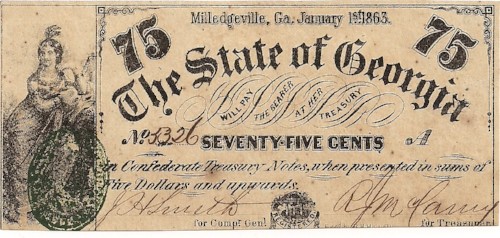
www.barrineaucurrency.com

